Itinerary
Day itinerary:
Like so many of the islands in the Galapagos San Cristobal is formed by dormant volcanoes. It lies to the east of the archipelago and is one of the oldest islands in the group. Approximately 6 000 people live on the island making their living from tourism fishing in government offices or off the rich volcanic soils with some limited farming existing in the highlands. Puerto Baquerizo Moreno on the southwestern tip of the island is the capital city of the Galapagos Islands. A statue of Charles Darwin graces the harbor marking one of the first places he likely stepped ashore in the 1830s.
Day itinerary:
Kicker Rock is the vertical remnant of a former tuff cone less than 5 kilometers to the west of San Cristobal. Both its Spanish name “Leon Dormido” (Sleeping Lion) and English name Kicker Rock imply that it is one rock only -when in fact it is a larger one 300 meters long by 100 meters wide with a maximum height of approximately 150 meters and next to it an obelisk-like rock separated by a narrow channel some 20 meters deep. When approaching Kicker Rock, Blue-footed Boobies, Nazca Boobies and frigatebirds can be observed in the air, while sea lions can be seen along the shore. Snorkelers and divers have reported manta rays, hammerhead sharks and turtles. The Spanish name implies that the geological formation seen from the south resembles a sleeping lion. An interesting explanation for the English name suggests that James Colnett in 1794 likened it to famous landmarks in Portsmouth.
Day itinerary:
Our ship anchors in sight of the volcanic moonscape of Isla Bartolomé at Sullivan Bay. Zodiacs bring guests ashore to ascend a boardwalk of 388 steps. Passing through the arid volcanic landscape provides a chance to watch for lava lizards Galapagos Hawks and Blue-footed Boobies. However the climber’s ultimate reward is one of the most beautiful panoramas in all of the Galapagos Islands – the view towards Pinnacle Rock with black volcanic cones of Baltra Daphne Major and Daphne Minor in the distance. On the way down watch how the sunlight catches the green of pioneering plant species in stark contrast against dark volcanic rock and look forward to time swimming and snorkeling from the golden beach at Bahia Dorada.
Day itinerary:
Buccaneer Cove is a colourful inlet on Santiago or James Island. It owes its name to some of the first visitors to the area: pirates. They came searching for water, tortoises, and some people say even places to hide their treasures. We don’t know about any pirate’s gold, but the area’s landscape is a treasure. The geology combines some tuff red cones with impressive basalt lava dikes and sills. The erosion has carved caves and shaped some rocks into unique forms such as the Bishop’s Rock. Palo Santo trees and some giant Prickly pear cactus cover the area, and at a distance, you can observe the impressive volcanos of Isabela Island. We will explore the area from our Zodiacs, searching for sea birds such as Nazca Boobies, Blue Footed Boobies, and Swallow-tailed Gulls. We can often find sea turtles and even reef sharks in this place. Also, in Buccaneer Cove, we can observe the two sea lions species: the Galapagos sea lion basking on the beaches and the fur seal looking for shade on the collapsed rocks along the coast.
Day itinerary:
Punta Vicente Roca is one of the marine sites Isabela Island has to offer. On the southern side of Ecuador Volcano, the tip of land on the western end of Isabela is named after Vicente Ramon Roca, President of Ecuador from 1845-49, who as Prefect of Guayas had proposed the Ecuadorian annexation of the Galapagos Islands in 1831. The geological formations, the underwater caves and lava tubes offer fascinating views of the coastline. The South Equatorial Countercurrent hits this part of the archipelago from the west and the water offers abundant food sources for different marine life and seabirds. It is normal to see Pacific green turtles, but sharks, rays, whales and dolphins can also be expected, apart from a small colony of fur seals. Blue-footed Boobies, Nazca Boobies, Brown Noddies and other seabirds nest in the cliffs and both the endemic Galapagos Penguins and Flightless Cormorants have established small colonies nearby. Marine iguanas also like this area because of the rich variety of seaweeds growing underwater along the western coast of Isabela. As a marine site, deepwater snorkeling is also possible at Punta Vicente Roca.
Day itinerary:
With the gentle slopes of La Cumbre volcano in the distance the low lava-forged coast of Punta Espinoza on Fernandina Island is a spectacular sight. Hundreds of marine iguanas rest on the black rock of recent lava flows absorbing heat from the stone and defending their territories against one another. Galapagos sea lions and their pups also take shelter here resting on the beach and playing in the shallow tide pools sprinkled along the coast. Walk past high sandy areas where marine iguanas lay their eggs and along low shallow mangrove ponds ringed with bright red Sally Lightfoot crabs and Flightless Cormorants drying their stubby wings in the sunshine.
Day itinerary:
Tagus Cove is bordered by a steep rocky coastline and has for centuries offered shelter for ships and yachts. The cove is named after the British frigate HMS Tagus visiting the Galapagos in 1814. Already by the 1830s other ships had their visits recorded by painting or scratching their name onto the rocks. On approach Galapagos Penguins and Flightless Cormorants –both birds mainly found on Isabela’s west coast and neighboring Fernandina- are often seen. From the landing a trail through an incense tree forest leads past Darwin Lake to a viewpoint on top of a splatter cone. During the hike several land birds including Medium Ground-Finches, Galapagos Hawks, Yellow Warblers as well as Large-billed and Vermilion Flycatchers are often present. Brown Noddies and Blue-footed Boobies prefer the rocks along the shore.
Day itinerary:
Elizabeth Bay is one of the marine sites on Isabela’s west coast. South of Alcedo Volcano and north of Sierra Negra, Elizabeth Bay is found at Isabela’s narrowest east-west extension where the lava flows of these two volcanoes have connected each other. Elizabeth Bay’s shores show mangroves and specifically the easternmost part, a cove which can only be entered via a narrow channel, has red, white and black mangroves. Different animals prefer different parts of Elizabeth Bay. Las Marielas, three rocks at the entrance to the bay, are favored by Blue-footed Boobies, Flightless Cormorants and Galapagos Penguins as a resting place, while the mangrove area is preferred by Great Blue Herons for hunting or the Magnificent Frigatebirds for perching. The bay is used by turtles, rays and even sharks for feeding or resting. The shallow water and the root system of the mangroves in the small inlet allow smaller fish to hide from bigger predators.
Day itinerary:
Floreana’s Post Office Bay has received its name as the site was used to leave mail for retrieval by others who were thought to stop at the Galapagos Islands or might be heading for the addressee’s direction. First mentioned by Porter in 1813 as “Hathaway’s Postoffice”, HMS Beagle’s captain FitzRoy stated that it was not in use in 1835 as the island was already settled at that time. Floreana had been the first island to be settled by Ecuadorians in 1832. Today a barrel instead of the original box is used by visitors who leave their own postcards and retrieve mail for hand-delivery. Apart from the beach and mail barrel the bay offers good swimming and snorkeling. The area holds remains of a failed Norwegian fish canning plant and settlement dating back to the 1920s. A lava tube in the vicinity can also be explored. Although Floreana is inhabited, the number of residents is reduced because of the difficult access to water. A track from Post Office Bay connects with the only road from Puerto Velazco Ibarra on the west coast to a spring in the highlands.
Day itinerary:
Champion Islet is a small islet some 700 meters off the northeast coast of Floreana. It is one of four marine sites surrounding Floreana and offers excellent deepwater snorkeling opportunities. Curious sea lions approach the snorkelers while turtles slowly swim by and sharks, sting rays, and a high diversity of colorful fishes can usually be seen. During a Zodiac cruise around Champion Islet not only seabirds such as Nazca Boobies, Swallow-tailed Gulls, or Red-billed Tropicbirds will be seen, it is also possible to spot the rare Floreana Mockingbird.
Day itinerary:
Floreana Island’s northernmost point is called Punta Cormorant – named after the British naval vessel HMS Cormorant and dating back to the late 19th century. From the landing beach a short track leads to a shallow lagoon that is famous for its flamingos. The brilliantly pink birds skim the salty waters for shrimp and tend to chicks on the nest. The trail then scales a low hillside through scattered Palo Santo trees to reveal an idyllic white-sand beach on the other side of the point. Standing at the edge of the lapping waves you might spot mammoth female sea turtles hauling themselves out of the sea to lay eggs in the sugar sand dunes that lay high above the tide line. Before returning to the landing site your guides may also point out White-cheeked Pintails Blue-footed Boobies Yellow Warblers and Medium and Small Ground Finches.
Day itinerary:
Silver Origin will anchor in front of Puerto Ayora Santa Cruz where the prestigious Charles Darwin Research Station is located. The station also houses the Fausto Llerena Breeding Center for giant tortoises and land iguanas where guides interpret the centre’s captive breeding and reintroduction programs. In addition to these star species throughout the station, there are huge prickly pear cactus trees being fed upon by the pretty Galapagos Cactus Finch. To round out the stay in Puerto Ayora enjoy free time in town where local artists have created charming art galleries and corner cafés.
Day itinerary:
Los Gemelos (The Twins) is a visitor site in the Santa Cruz highlands. Found some 15 kilometers northwest of Puerto Ayora, the road leading from Puerto Ayora in the south of Santa Cruz to Itabaca in the north dissects the twin pit craters. Pit craters are formed when the roof of an underground void collapses. The smaller pit crater is on the eastern side of the road, while the larger one is on the western side. See from above, the two openings in the ground are not at all identical. Their layout might imply an elongated magma chamber or a lava tube leading further west and the larger twin actually having formerly been two small pit craters whose connecting wall collapsed as well. Trails through a Scalesia forest not only give access to good views of the pit craters, but also permit to observe some of the smaller land birds. Vermilion Flycatchers, Yellow Warblers, Galapagos Doves, Medium Ground Finches and several other finch species can often be seen there.
Day itinerary:
Cerro Dragón’s land iguanas once played an important part in a conservation program headed by the Charles Darwin Foundation and the Galapagos National Park. When the reptiles’ numbers declined in the 1970s some animals were taken to breed in captivity and were released back into undeveloped areas. Today it is an honor to see the success of this program firsthand at Cerro Dragón. Walk inland on a trail past small saltwater lagoons that periodically feature flamingos to see the reintroduced animals. In a periodic local phenomenon during rainier times the salinity in the lagoons drops with the inflow of freshwater. As a consequence crustacean populations decline which in turn means the shorebirds become scarce.
Day itinerary:
Guy Fawkes is a group of four islets situated on the northwestern side of Santa Cruz Island. They are satellite cones, surrounded by deep waters. As they rise from the deep, they intercept with the strong sea currents making the area a place full of life. These small islets have beautiful underwater cliffs covered with all sorts of marine invertebrates such as sponges, corals, sea stars, urchins — making it a very colourful place for deep water snorkelling. Due to the conditions mentioned above, it results in some immense aggregations of fish, and, due to the depth of the water, it is not unusual to find Sharks or Manta Rays. Guy Fawkes is one of the most exciting places to deep water snorkel. You never know what you will find.
Day itinerary:
Like so many of the islands in the Galapagos San Cristobal is formed by dormant volcanoes. It lies to the east of the archipelago and is one of the oldest islands in the group. Approximately 6 000 people live on the island making their living from tourism fishing in government offices or off the rich volcanic soils with some limited farming existing in the highlands. Puerto Baquerizo Moreno on the southwestern tip of the island is the capital city of the Galapagos Islands. A statue of Charles Darwin graces the harbor marking one of the first places he likely stepped ashore in the 1830s.
Day itinerary:
Kicker Rock is the vertical remnant of a former tuff cone less than 5 kilometers to the west of San Cristobal. Both its Spanish name “Leon Dormido” (Sleeping Lion) and English name Kicker Rock imply that it is one rock only -when in fact it is a larger one 300 meters long by 100 meters wide with a maximum height of approximately 150 meters and next to it an obelisk-like rock separated by a narrow channel some 20 meters deep. When approaching Kicker Rock, Blue-footed Boobies, Nazca Boobies and frigatebirds can be observed in the air, while sea lions can be seen along the shore. Snorkelers and divers have reported manta rays, hammerhead sharks and turtles. The Spanish name implies that the geological formation seen from the south resembles a sleeping lion. An interesting explanation for the English name suggests that James Colnett in 1794 likened it to famous landmarks in Portsmouth.
Day itinerary:
Like so many of the islands in the Galapagos San Cristobal is formed by dormant volcanoes. It lies to the east of the archipelago and is one of the oldest islands in the group. Approximately 6 000 people live on the island making their living from tourism fishing in government offices or off the rich volcanic soils with some limited farming existing in the highlands. Puerto Baquerizo Moreno on the southwestern tip of the island is the capital city of the Galapagos Islands. A statue of Charles Darwin graces the harbor marking one of the first places he likely stepped ashore in the 1830s.
Day itinerary:
Genovesa is one of the northernmost islands of the archipelago. Genovesa’s southern side of the shield volcano’s crater collapsed and a protected bay known as Darwin Bay was formed. The island is often referred to as the “Bird Island” as the numbers and species of land and seabirds on Genovesa are quite extraordinary. There are two visitor sites, and Prince Philip’s Steps give access to the flat plateau above the bay. Named after Prince Philip who visited the Galapagos on two occasions, the “steps” are mostly natural. The steep cliffs are home to Red-billed Tropicbirds, while Magnificent Frigatebirds, Nazca and Red-footed Boobies prefer the top. The plateau above Prince Philip’s Steps has a palo santo forest and an extensive lava field. This is an area where one of the Galapagos’ top predators, the Short-eared Owl, is hunting storm petrels. The Short-eared Owls are extremely well camouflaged and are not always easy to spot in between the rocks.
Day itinerary:
At Genovesa Island the ship tucks into Darwin Bay an ancient volcanic crater now flooded by the sea. Zodiacs land on a picturesque sandy beach where Galapagos sea lions often rest on the fine white sand. Explorations along the shore may reveal marine iguanas looking like prehistoric dinosaurs in miniature. By heading inland a short distance visitors could encounter seabirds of all shapes and sizes nesting in the vegetation. Scores of immature Red-footed Boobies perch on branches within an arm’s reach of the path. In addition watch for Great Frigatebirds and Yellow-crowned Night Herons along the walk. There is also fantastic snorkeling in the waters of Darwin Bay with the opportunity to see large schools of reef fish and brightly colored sea stars.
Day itinerary:
The landing at North Seymour Island is onto black lava rock. After a short climb visitors arrive on the island’s flat plateau where a number of sea lions nurse pups and frigatebirds nest. The island is dry and so the predominant tree is the prickly pear cactus favored by the yellow Conolophus land iguanas that live here in number. The undulating terrain is littered with red-brown volcanic boulders and large male Magnificent Frigatebirds can be seen inflating their vivid red gular sacs in hopes of impressing females flying overhead. At certain times of the year pairs of Blue-footed Boobies dance here in a ritualized mating dance that reinforces their pair bond and shows off their vivid blue feet. The snorkeling here is well-known for schools of colorful creole wrasses and parrot fish.
Day itinerary:
The lava fields of Sullivan Bay on Santiago Island will inevitably remind visitors of the surface of the moon. As brilliant red Sally Lightfoot crabs scuttle along the black volcanic shores learn about the formation of the islands through geological forces from your guides. The lava flows here are just over one hundred years old and date back to 1897. The lava took on a rope-like appearance and geologists have adopted a Hawaiian word pahoehoe as the technical name for this kind of volcanic rock. After walking the exposed rocky terrain it is a welcoming sensation to return to the sandy beach and get ready for a swim or a snorkel.
Day itinerary:
Among the impressive new lava fields of Fernandina Island hides a cove surrounded by mangroves. A rewarding place for bird-watching as the bay is the point where the land meets the sea, joining the two environments, with sea birds, shorebirds and land birds all in the same place. The different species of mangroves: Red, White and Black, have formed a root system that serves as a nursery for many species of fish, including juveniles’ sharks and green sea turtles. Snorkeling is as rewarding with some unique sightings as Marine Iguanas feeding on algae, or flightless cormorants diving for their prey.
Day itinerary:
Impressive Pahoehoe lava field that lies between two active volcanoes, Sierra Negra and Cerro Azul, on the south coast of Isabela Island. The rich waters of Cromwell Current wash the shores, and as a result, you can see the largest marine iguanas of the archipelago basking on the rocks, Flightless Cormorants and Galapagos Penguins diving for food.
Day itinerary:
Los Gemelos (The Twins) is a visitor site in the Santa Cruz highlands. Found some 15 kilometers northwest of Puerto Ayora, the road leading from Puerto Ayora in the south of Santa Cruz to Itabaca in the north dissects the twin pit craters. Pit craters are formed when the roof of an underground void collapses. The smaller pit crater is on the eastern side of the road, while the larger one is on the western side. See from above, the two openings in the ground are not at all identical. Their layout might imply an elongated magma chamber or a lava tube leading further west and the larger twin actually having formerly been two small pit craters whose connecting wall collapsed as well. Trails through a Scalesia forest not only give access to good views of the pit craters, but also permit to observe some of the smaller land birds. Vermilion Flycatchers, Yellow Warblers, Galapagos Doves, Medium Ground Finches and several other finch species can often be seen there.
Day itinerary:
Silver Origin will anchor in front of Puerto Ayora Santa Cruz where the prestigious Charles Darwin Research Station is located. The station also houses the Fausto Llerena Breeding Center for giant tortoises and land iguanas where guides interpret the centre’s captive breeding and reintroduction programs. In addition to these star species throughout the station, there are huge prickly pear cactus trees being fed upon by the pretty Galapagos Cactus Finch. To round out the stay in Puerto Ayora enjoy free time in town where local artists have created charming art galleries and corner cafés.
Day itinerary:
Isla Champion is a small islet off Floreana Island’s northeast coast. To cruise by it reveals a bare rocky island without much allure but to enter the infinitely blue waters around this small landmass is to discover a spectacular underwater realm. The visibility is generally impressive and thanks to this water clarity snorkelers often spot reef sharks patrolling the reef wall cruising Pacific green turtles and playful Galapagos sea lions. Encounters in the blue with thousands of small silver minnows large tuna fish or oceanic sunfish are not unheard of either.
Day itinerary:
Punta Suárez lies at the western point of Española the oldest island in the Galápagos. Sheer cliffs provide superb thermals for seabirds and you may spot Swallow-tailed Gulls Nazca Boobies and Blue-footed Boobies on the breeze. The largest seabird to nest in the Galapagos Islands is the Waved Albatross. These ocean wanderers can be seen seasonally here from April through December when pairs reunite on Española going through an elaborate pair-bonding display. Mockingbirds doves and occasional Galápagos Hawks can also be seen on the point along with sea lions and colorful marine iguanas.
Day itinerary:
An impressive tuff cone has been carved by erosion into an outstanding natural sculpture, being a resting place for marine birds such as blue-footed bobbies and brown pelicans. One of the most beautiful white sand beaches of the Galapagos (swim or snorkel). View sea lions, sally light footed crabs, blue-footed bobbies. Behind the dunes, you find a coastal lagoon, which was visited in the past by the locals to extract salt, today it is home to some shorebirds such as stilts and plovers.
Day itinerary:
Like so many of the islands in the Galapagos San Cristobal is formed by dormant volcanoes. It lies to the east of the archipelago and is one of the oldest islands in the group. Approximately 6 000 people live on the island making their living from tourism fishing in government offices or off the rich volcanic soils with some limited farming existing in the highlands. Puerto Baquerizo Moreno on the southwestern tip of the island is the capital city of the Galapagos Islands. A statue of Charles Darwin graces the harbor marking one of the first places he likely stepped ashore in the 1830s.
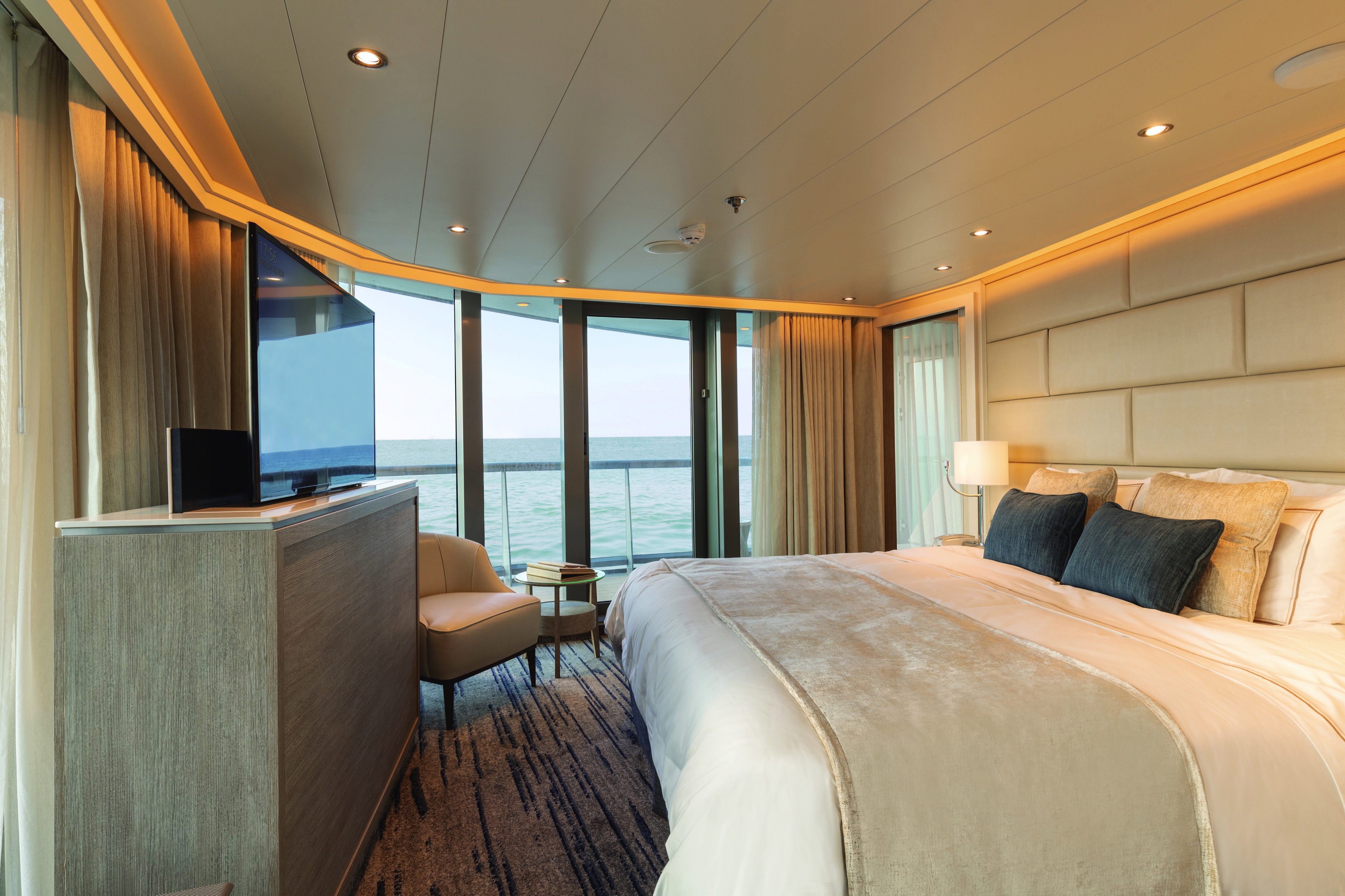
The name says it all; truly the apex of luxury, the Owner’s Suite is for those who want to experience the islands in comfort. A separate bedroom, modern bathroom with whirlpool bath with ocean views and elegant seating area ensure privacy and cosiness are the name of the game, while the vast veranda means full island immersion is assured.
One bedroom: 160 sq.m. including veranda
Two bedroom: 160 m² including veranda
Images are intended as a general reference. Features, materials, finishes and layout may be different than shown.
Please note that the 3rd guest will sleep on a comfortable sofa bed in the reception area of the suite.
Essentials
- Deck(s): 6
- Section: Aft
Characteristics
- Veranda
- Separate dining area
- Living room with sitting area
- Double vanity
- Separate shower
- Whirlpool bath
- Walk-in wardrobe with personal safe
Furniture
- King size bed
- Writing desk
- Vanity table
- Luxury bed mattresses
Media & Communication
- Unlimited Premium Wi-Fi
- 2 large flat screen TVs with Interactive Media Library
- Sound system with bluetooth connectivity
- Direct dial telephone
- Wall mounted USB-C mobile device chargers
- Dual voltage 110/220 outlets
Onboard Services
- Butler service
- Complimentary laundry, pressing & wet cleaning
- Daily canapé service, Welcome chocolate, Welcome fruit stand
- Champagne on arrival
Amenities
- Espresso machine
- Pillow menu
- Refrigerator and bar setup stocked with your preferences
- Plush bathrobe
- Luxury bath amenities
- Umbrella
- Hair Dryer
- Slippers
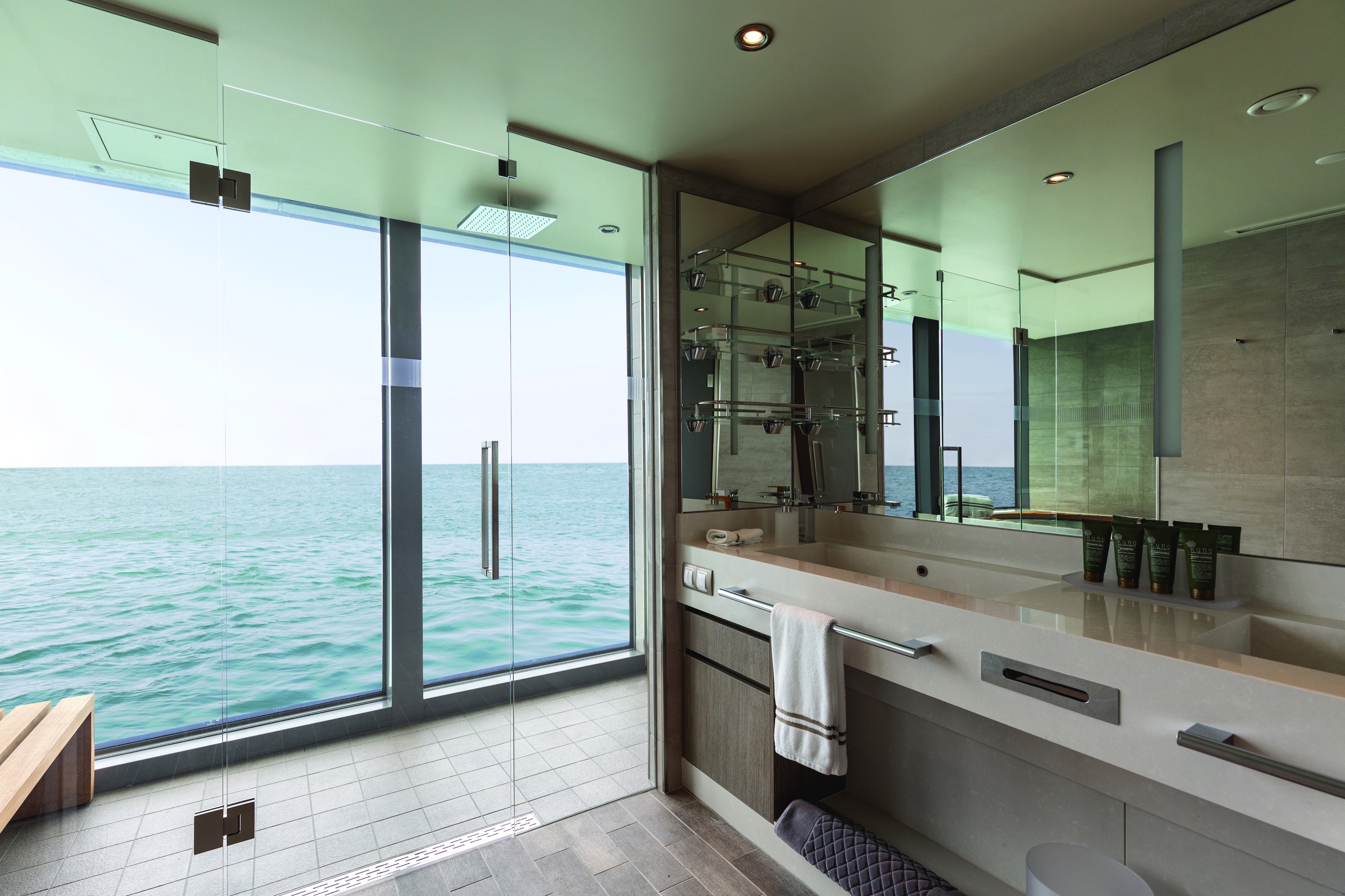
Grand by name and grand by nature! A prefect compliment to your Galapagos Islands cruise, the Grand suite affords superb views from morning to night thanks to a glass-panelled wall in the living area. A large, private veranda and ocean-view bathroom makes the most of the destination. Beautifully furnished and appointed, the Grand Suite is the perfect answer for those who like to explore in luxury.
One bedroom: 95 sq.m. including veranda
Two bedroom: 95 m² including veranda (25 m²)
Images are intended as a general reference. Features, materials, finishes and layout may be different than shown.
Please note that the 3rd guest will sleep on a comfortable sofa bed in the reception area of the suite.
Essentials
- Deck(s): 5
- Section: Aft, Port
Characteristics
- Veranda
- Separate dining area
- Living room with sitting area
- Double vanity
- Separate shower
- Whirlpool bath
- Walk-in wardrobe with personal safe
Furniture
- King size bed
- Writing desk
- Vanity table
- Luxury bed mattresses
Media & Communication
- Unlimited Premium Wi-Fi
- 2 large flat screen TVs with Interactive Media Library
- Sound system with bluetooth connectivity
- Direct dial telephone
- Wall mounted USB-C mobile device chargers
- Dual voltage 110/220 outlets
Onboard Services
- Butler service
- Complimentary laundry, pressing & wet cleaning
- Daily canape service, Welcome chocolate, Welcome fruit stand
- Champagne on arrival
Amenities
- Espresso machine
- Pillow menu
- Refrigerator and bar setup stocked with your preferences
- Plush bathrobe
- Luxury bath amenities
- Umbrella
- Hair Dryer
- Slippers
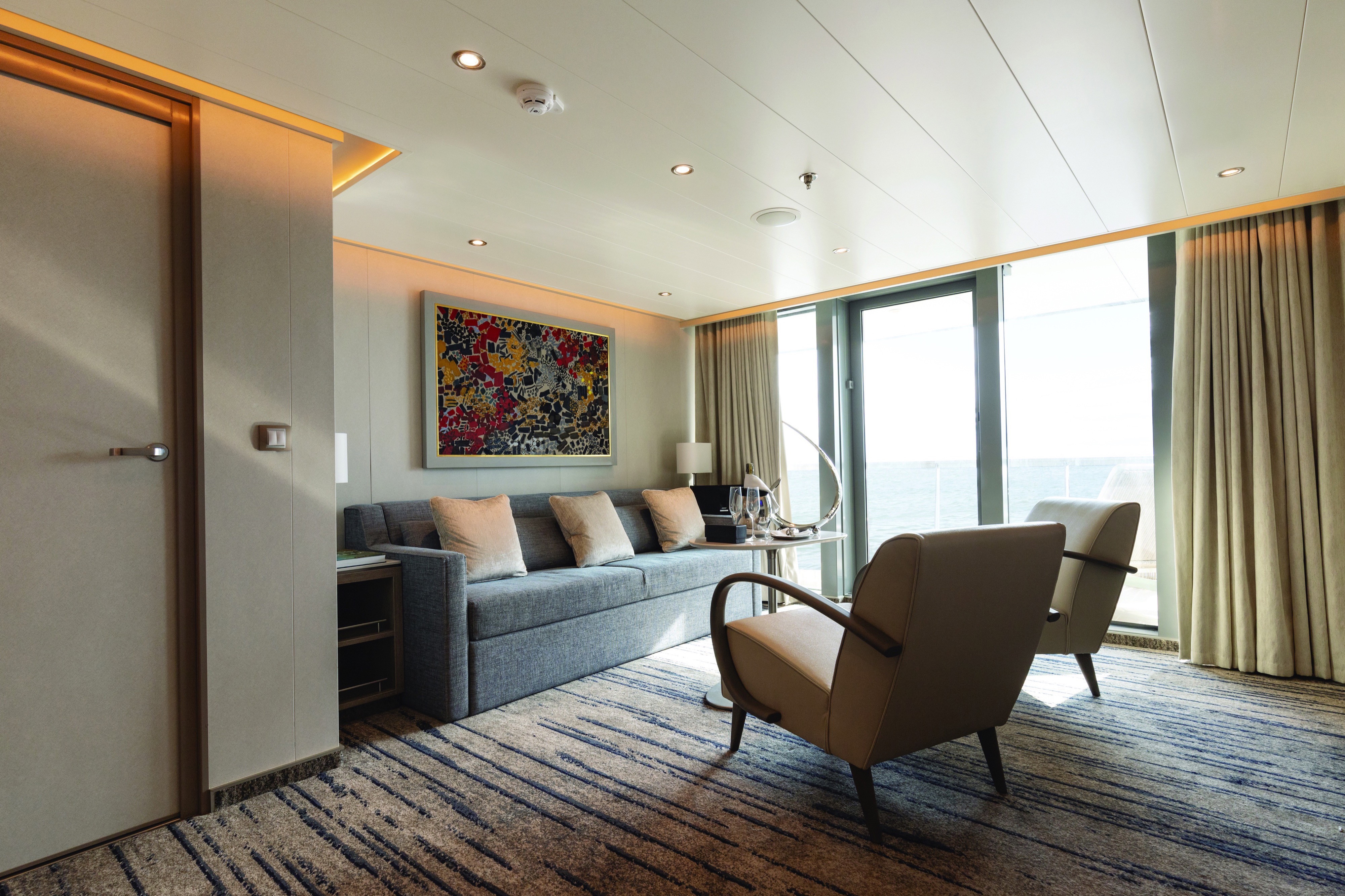
The Royal Suite really is fit for a king! Among our largest on offer, not only does this suite have a private, spacious veranda, but the privileged back ship location means that you’re sure to get the best views there are! Expect all your favourite comforts inside: large ocean-view bathroom with whirlpool bath with walk-in shower, state-of-the-art entertainment system and plush bedding to ensure the best night sleep you’ve ever had.
One bedroom: 83 sq.m. including veranda
Two bedroom: 83 m² including veranda (28 m²)
Images are intended as a general reference. Features, materials, finishes and layout may be different than shown.
Please note that the 3rd guest will sleep on a comfortable sofa bed in the reception area of the suite.
Essentials
- Deck(s): 5
- Section: Aft, Starboard
Characteristics
- Veranda
- Living room with sitting area
- Double vanity
- Separate shower
- Whirlpool bath
- Walk-in wardrobe with personal safe
Furniture
- King size bed
- Writing desk
- Vanity table
- Luxury bed mattresses
Media & Communication
- Unlimited Premium Wi-Fi
- 2 large flat screen TVs with Interactive Media Library
- Sound system with bluetooth connectivity
- Direct dial telephone
- Wall mounted USB-C mobile device chargers
- Dual voltage 110/220 outlets
Onboard Services
- Butler service
- Complimentary laundry, pressing & wet cleaning
- Daily canapé service, Welcome chocolate, Welcome fruit stand
- Champagne on arrival
Amenities
- Espresso machine
- Pillow menu
- Refrigerator and bar setup stocked with your preferences
- Plush bathrobe
- Luxury bath amenities
- Umbrella
- Hair Dryer
- Slippers
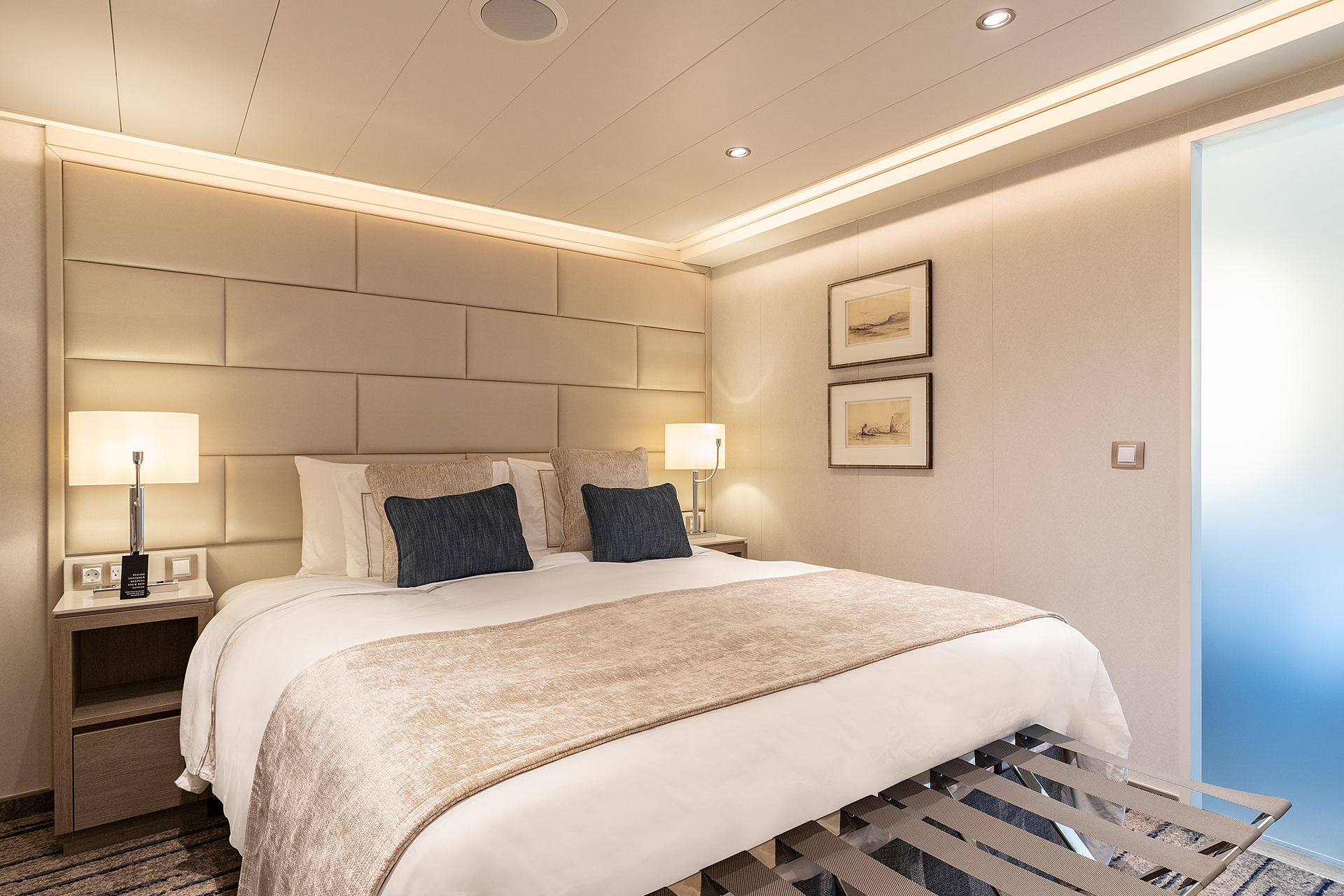
There has never been a better time to get up close and personal with the Galapagos’ fabled marine life than with the Silver Suite. Enormous floor-to-ceiling windows look out onto the beauty of the ocean and its inhabitants. An ocean-view whirlpool bath allows you to experience the beauty of the islands, while enjoying the creature comforts of Silversea. Deluxe furnishings complete the experience.
One bedroom: 50 sq.m. including veranda
Wheelchair accessible suites: 6022, 7018
Images are intended as a general reference. Features, materials, finishes and layout may be different than shown.
Essentials
- Deck(s): 5
- Section: Forward
Characteristics
- Veranda
- Living room with sitting area
- Large vanity
- Separate shower
- Whirlpool bath
- Walk-in wardrobe with personal safe
Furniture
- Queen size bed
- Writing desk
- Vanity table
- Luxury bed mattresses
Media & Communication
- Unlimited Premium Wi-Fi
- 2 large flat screen TVs with Interactive Media Library
- Direct dial telephone
- Wall mounted USB-C mobile device chargers
- Dual voltage 110/220 outlets
Onboard Services
- Butler service
- Complimentary laundry, pressing & wet cleaning
- Daily canape service, Welcome chocolate, Welcome fruit stand
- Champagne on arrival
Amenities
- Espresso machine
- Pillow menu
- Refrigerator and bar setup stocked with your preferences
- Plush bathrobe
- Luxury bath amenities
- Umbrella
- Hair Dryer
- Slippers
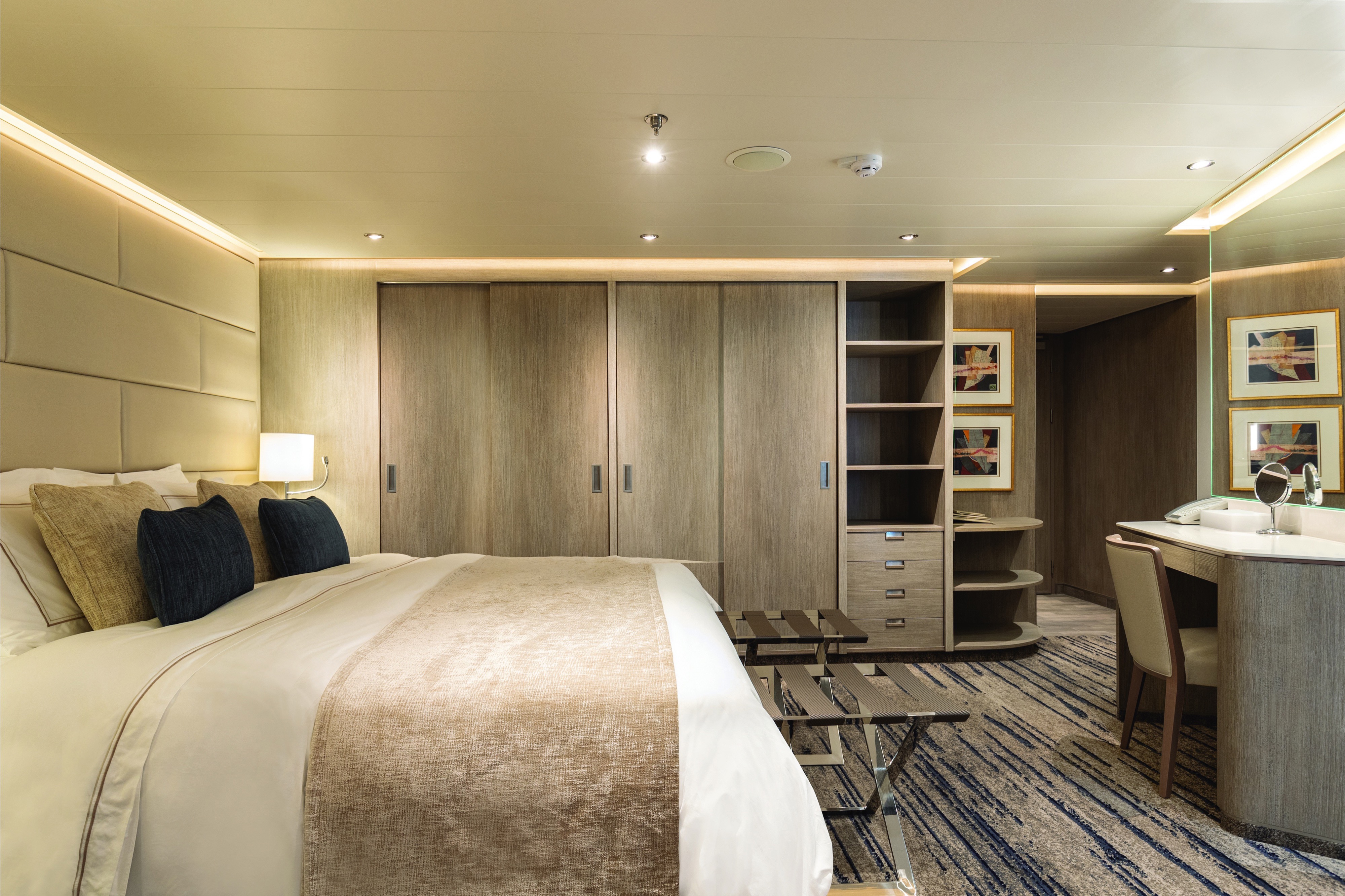
The Medallion Suite wears its name well – as it truly the gold medal of comfort in the Galapagos Islands. Designed with the adventurous guest in mind, enlarge your suite at the touch of the button with our unique Horizon Balcony. The perfect hybrid of expedition and luxury, the Medallion Suite features rich furnishings for easy-going comfort. An ocean view walk in shower extends your adventure even further.
One bedroom: 33 sq.m. including horizon balcony
Images are intended as a general reference. Features, materials, finishes and layout may be different than shown.
Essentials
- Deck(s): 6
- Section: Forward
Characteristics
- Horizon Balcony
- Sitting area
- Large vanity
- Separate shower
- Walk-in wardrobe with personal safe
Furniture
- Queen size bed
- Writing desk
- Vanity table
- Luxury bed mattresses
Media & Communication
- Unlimited Premium Wi-Fi
- 2 large flat screen TVs with Interactive Media Library
- Direct dial telephone
- Wall mounted USB-C mobile device chargers
- Dual voltage 110/220 outlets
Onboard Services
- Butler service
- Complimentary laundry, pressing & wet cleaning
- Daily canapé service, Welcome chocolate, Welcome fruit stand
- Champagne on arrival
Amenities
- Espresso machine
- Pillow menu
- Refrigerator and bar setup stocked with your preferences
- Plush bathrobe
- Luxury bath amenities
- Umbrella
- Hair Dryer
- Slippers
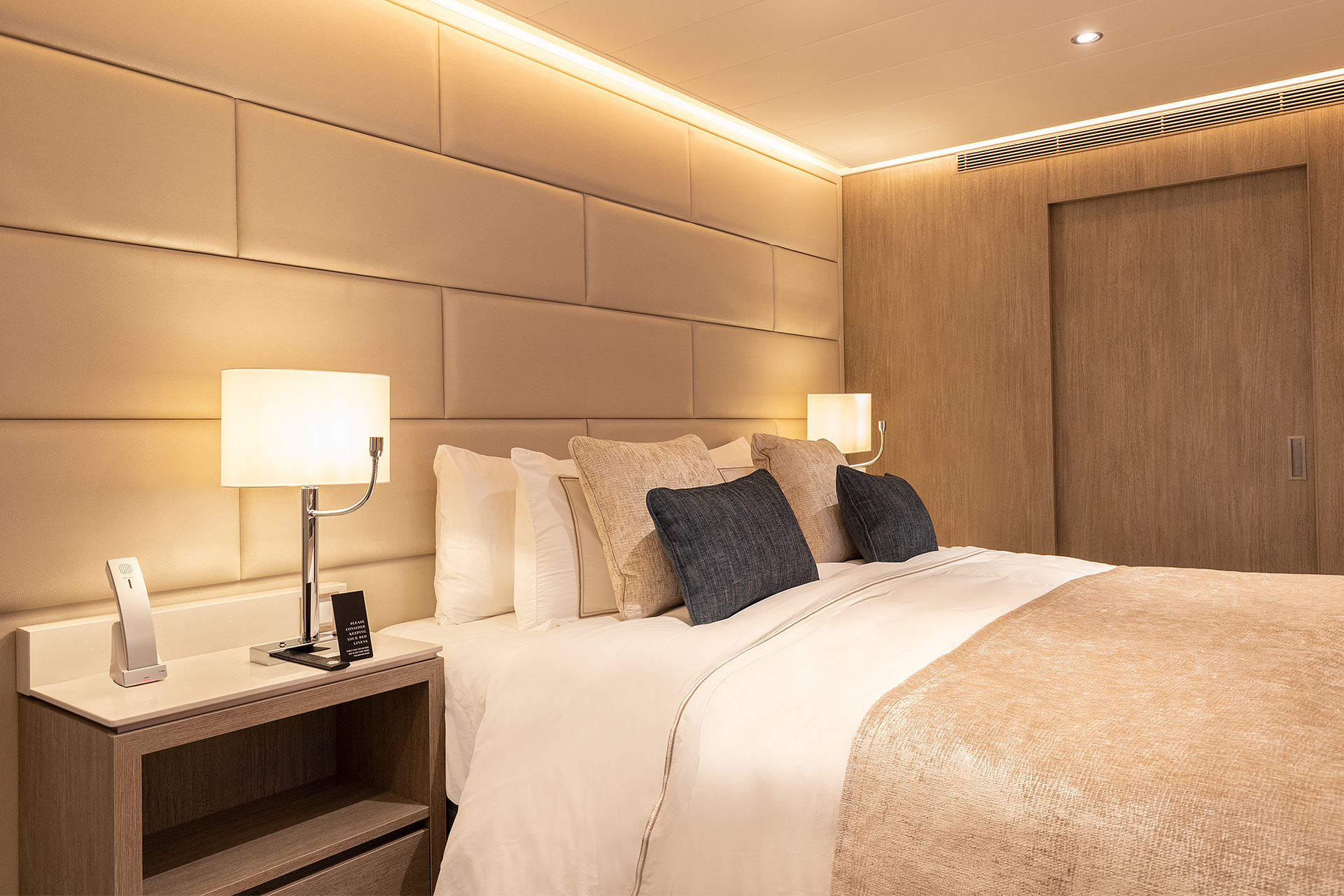
An ocean view walk-in shower plus our unique Horizon Balcony makes this the people’s choice when it comes to sailing the Galapagos Islands. Expertly designed and exquisitely appointed, Deluxe Veranda Suites are warm, spacious and elegantly designed, so that you can make the most of your adventure, without missing the comforts of home.
One bedroom: 31 sq.m. including horizon balcony
Images are intended as a general reference. Features, materials, finishes and layout may be different than shown.
Essentials
- Deck(s): 6
- Section: Aft
Characteristics
- Horizon Balcony
- Sitting area
- Large vanity
- Separate shower
- Walk-in wardrobe with personal safe
Furniture
- Queen size bed
- Writing desk
- Vanity table
- Luxury bed mattresses
Media & Communication
- Unlimited Standard Wi-Fi
- 1 large flat screen TV with Interactive Media Library
- Direct dial telephone
- Wall mounted USB-C mobile device chargers
- Dual voltage 110/220 outlets
Onboard Services
- Butler service
- Champagne on arrival
Amenities
- Pillow menu
- Refrigerator and bar setup stocked with your preferences
- Plush bathrobe
- Luxury bath amenities
- Umbrella
- Hair Dryer
- Slippers
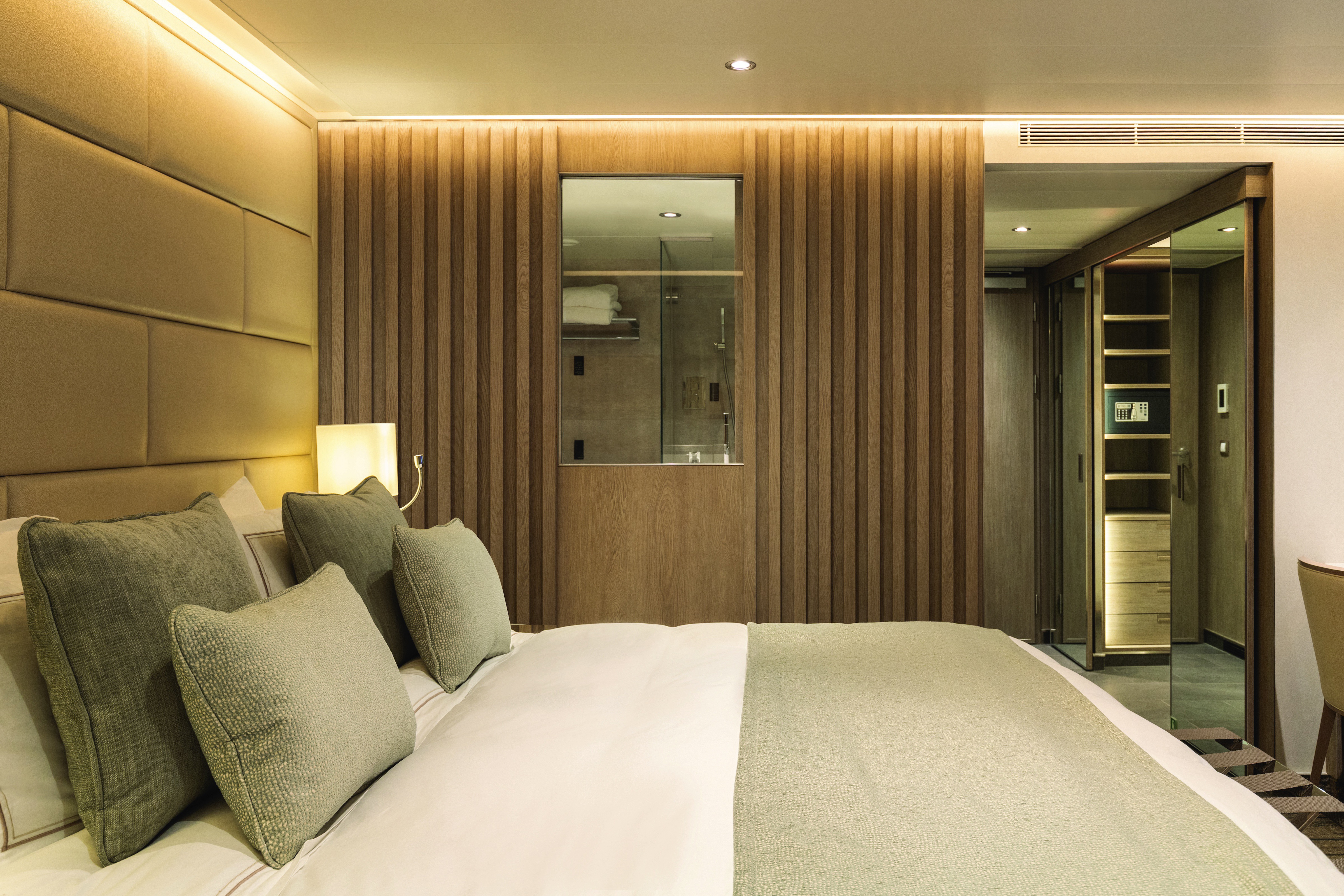
Our Superior Veranda Suite is designed to give you immersion far beyond excursion in the Galapagos. Silver Origin’s unique Horizon Balcony converts your suite at the touch of a button, transforming your balcony into inside seating area. A large bathroom with window into the suite makes this an enviable option when choosing your Galapagos cruise.
One bedroom: 30 sq.m. including horizon balcony
Images are intended as a general reference. Features, materials, finishes and layout may be different than shown.
Essentials
- Deck(s): 6
- Section: Mid-Ship
Characteristics
- Horizon Balcony
- Sitting area
- Large vanity
- Separate shower
- Walk-in wardrobe with personal safe
Furniture
- Queen size bed
- Writing desk
- Vanity table
- Luxury bed mattresses
Media & Communication
- Unlimited Standard Wi-Fi
- 1 large flat screen TV with Interactive Media Library
- Direct dial telephone
- Wall mounted USB-C mobile device chargers
- Dual voltage 110/220 outlets
Onboard Services
- Butler service
- Champagne on arrival
Amenities
- Pillow menu
- Refrigerator and bar setup stocked with your preferences
- Plush bathrobe
- Luxury bath amenities
- Umbrella
- Hair Dryer
- Slippers
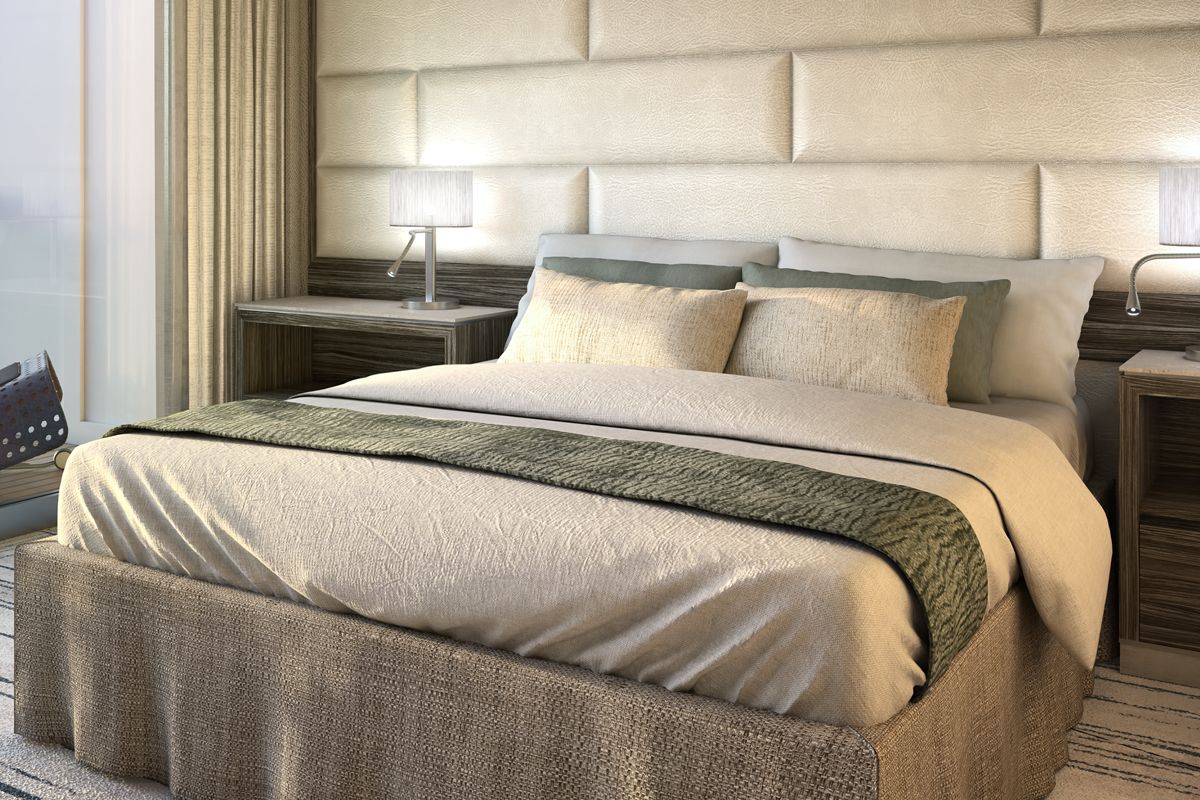
Stylish and sophisticated, the Classic Veranda is a haven of peace at the end of a busy day of discovery. A private veranda brings your destination even closer to home. Full butler service completes this suite.
One bedroom: 30 sq.m. including veranda
Images are intended as a general reference. Features, materials, finishes and layout may be different than shown.
Please note that the 3rd guest will sleep on a comfortable sofa bed in the reception area of the suite.
Essentials
- Deck(s): 5
- Section: Mid-Ship
Characteristics
- Veranda
- Sitting area
- Large vanity
- Separate shower
- Walk-in wardrobe with personal safe
Furniture
- Queen size bed
- Writing desk
- Vanity table
- Luxury bed mattresses
Media & Communication
- Unlimited Standard Wi-Fi
- 1 large flat screen TV with Interactive Media Library
- Direct dial telephone
- Wall mounted USB-C mobile device chargers
- Dual voltage 110/220 outlets
Onboard Services
- Butler service
- Champagne on arrival
Amenities
- Pillow menu
- Refrigerator and bar setup stocked with your preferences
- Plush bathrobe
- Luxury bath amenities
- Umbrella
- Hair Dryer
- Slippers
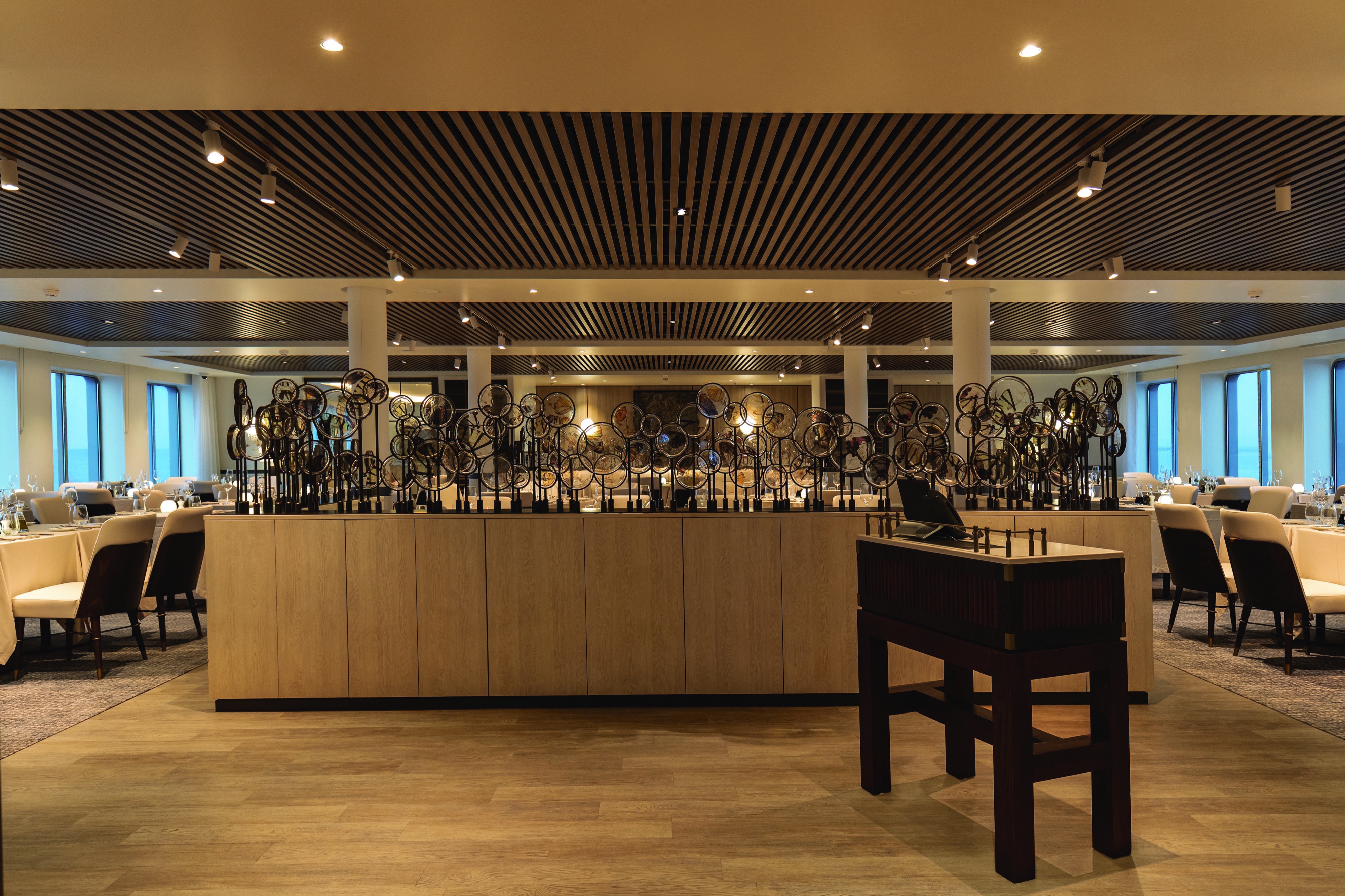
This refined dining room benefits from abundant natural light and stunning views of the destination, thanks to the large floor-to-ceiling glass windows. Serving breakfast, lunch and dinner, The Restaurant will offer the highest expression of the local cuisine, together with a wide range of international selections.
Images are intended as a general reference. Features, materials, finishes and layout may be different than shown.
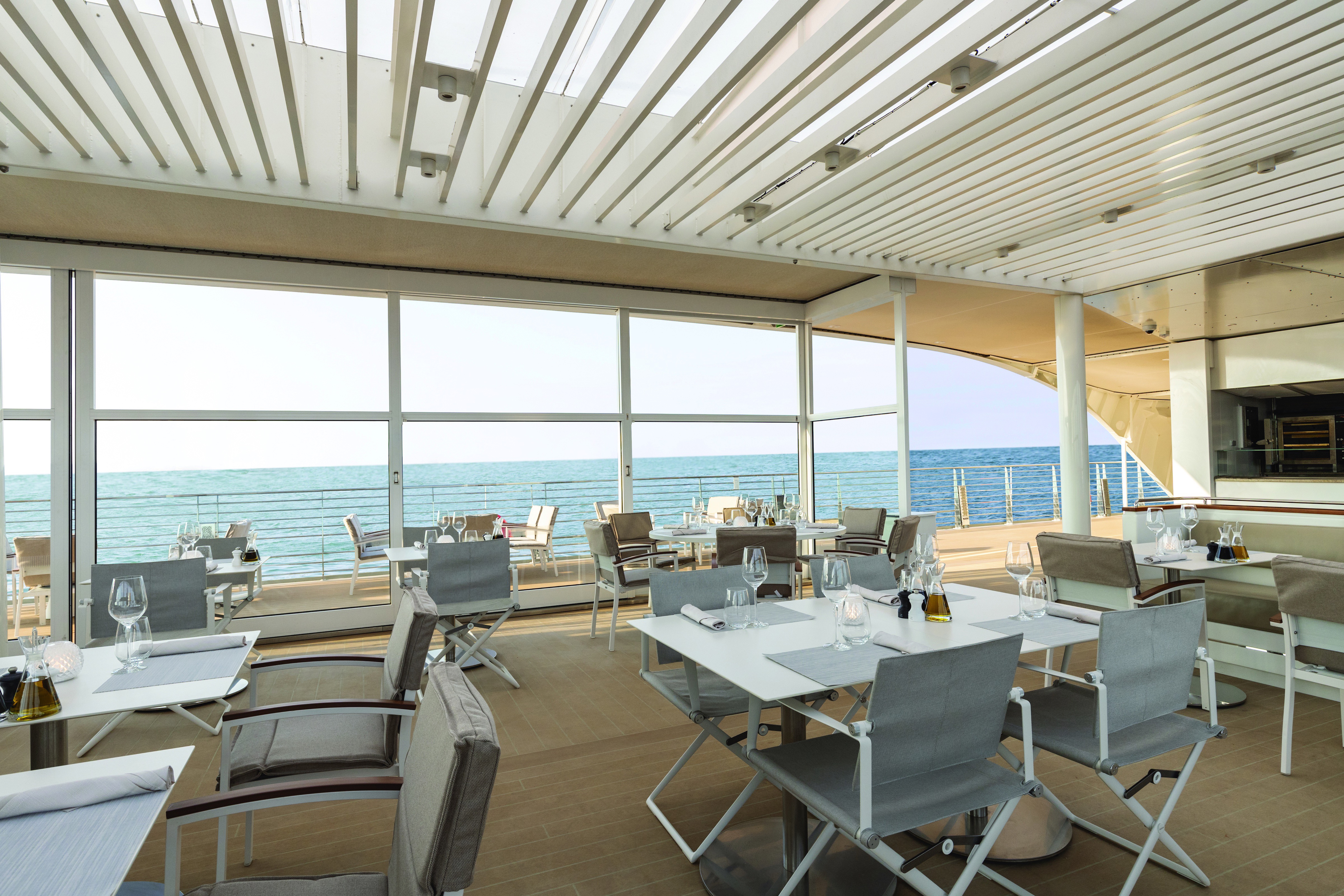
Our famous Grill restaurant in the heart of the Galapagos Islands, offering al-fresco lunches by day and Silversea’s signature Hot Rocks concept by night. Thanks to an advanced sheltering system, The Grill can be enclosed to maximise guest comfort in case of wind and lowering temperatures.
Images are intended as a general reference. Features, materials, finishes and layout may be different than shown.
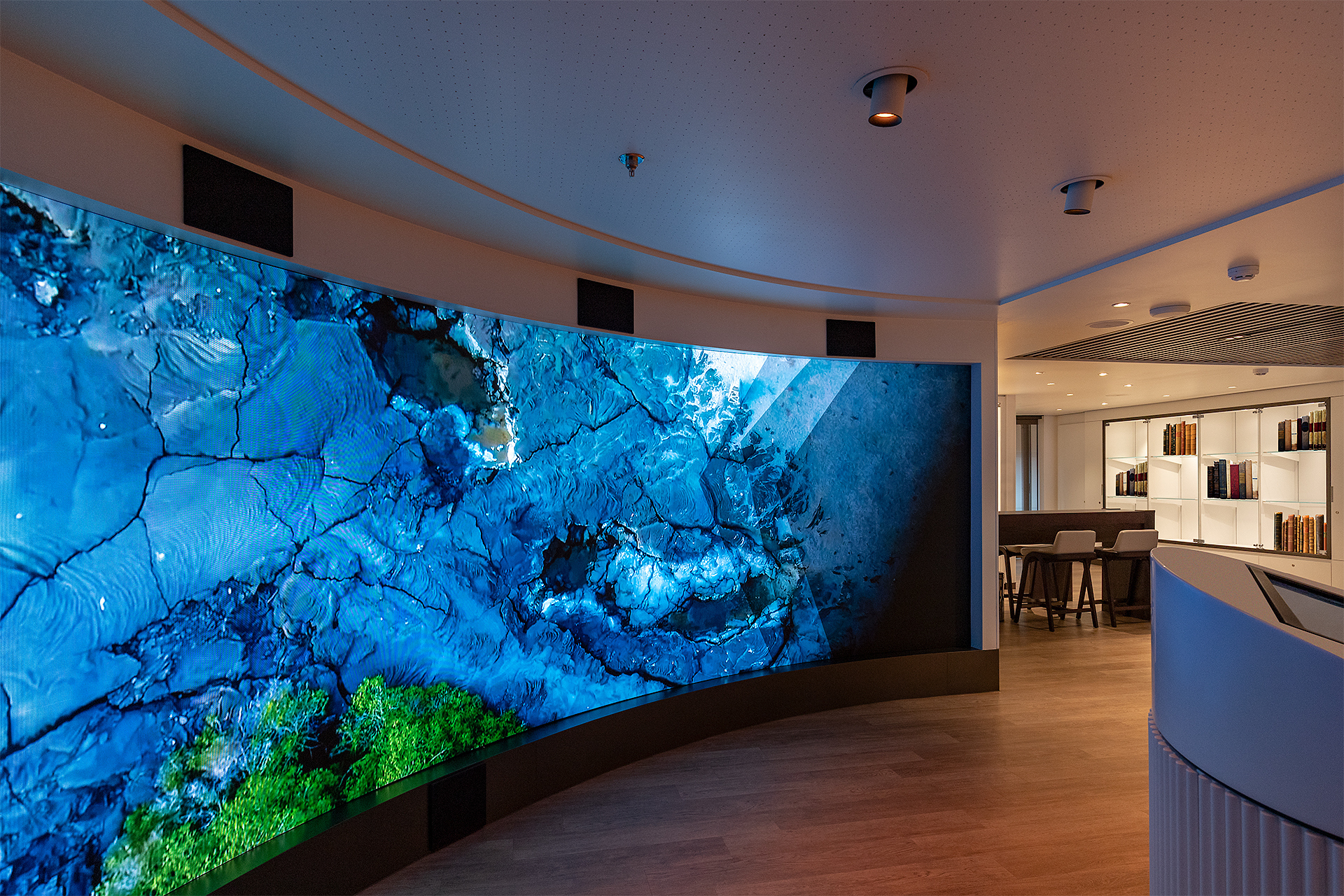
The perfect meeting point for Zodiac excursions, the Basecamp has been specially designed to offer guest a chance to prepare for their next adventure. Featuring an interactive wall, the Basecamp doubles as an information HQ where guests access information on the fascinating flora and fauna of the Galapagos Islands.
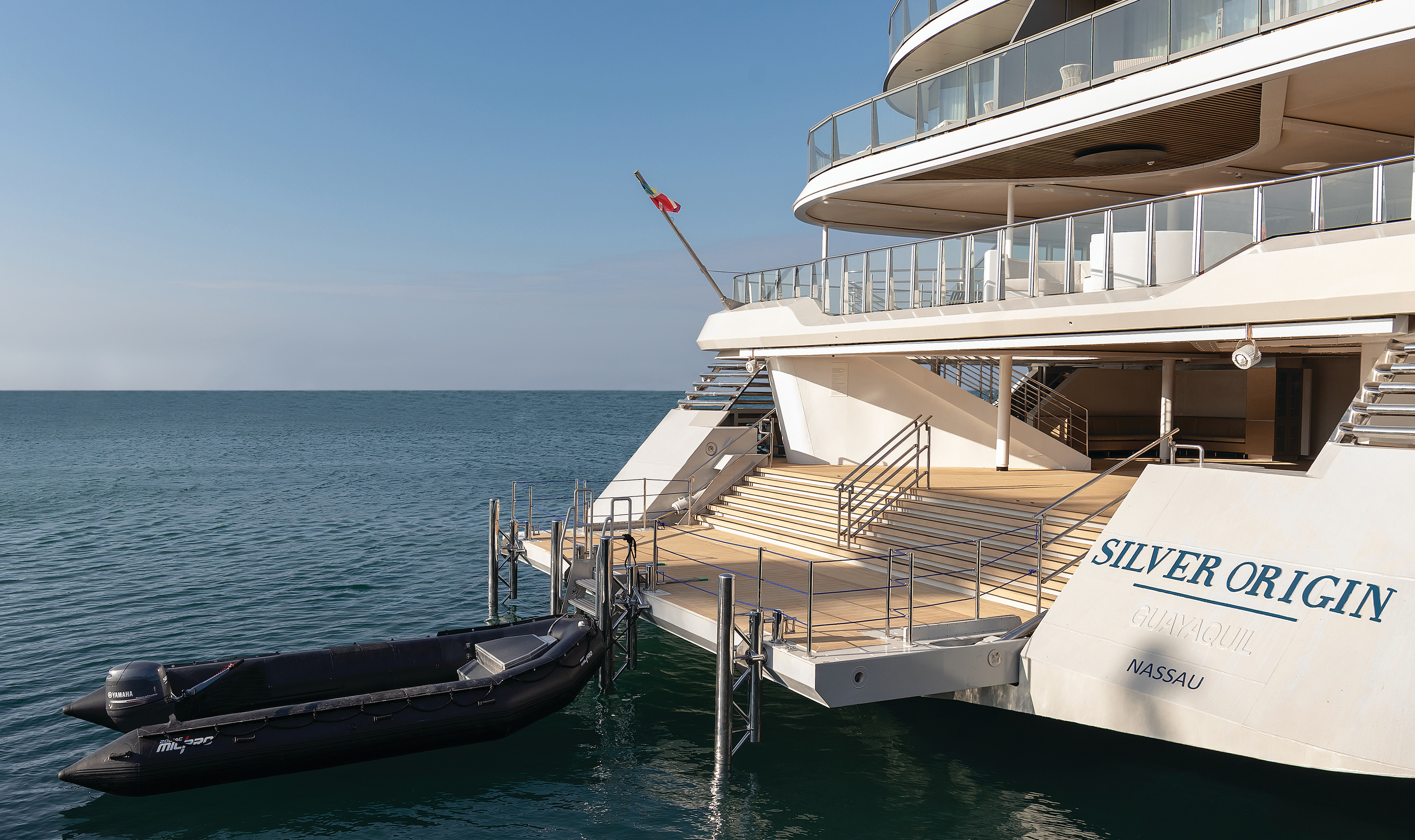
Offering the highest Zodiac-to-guest ratio in the region, at 1:12.5, Silver Origin will offer a luxurious outpost from which guests will enjoy personalised experience throughout the Galapagos Islands. Every aspect of guests’ cruise experiences will be tailored to take them closer to the authentic beauty of the Galapagos Islands in luxury.
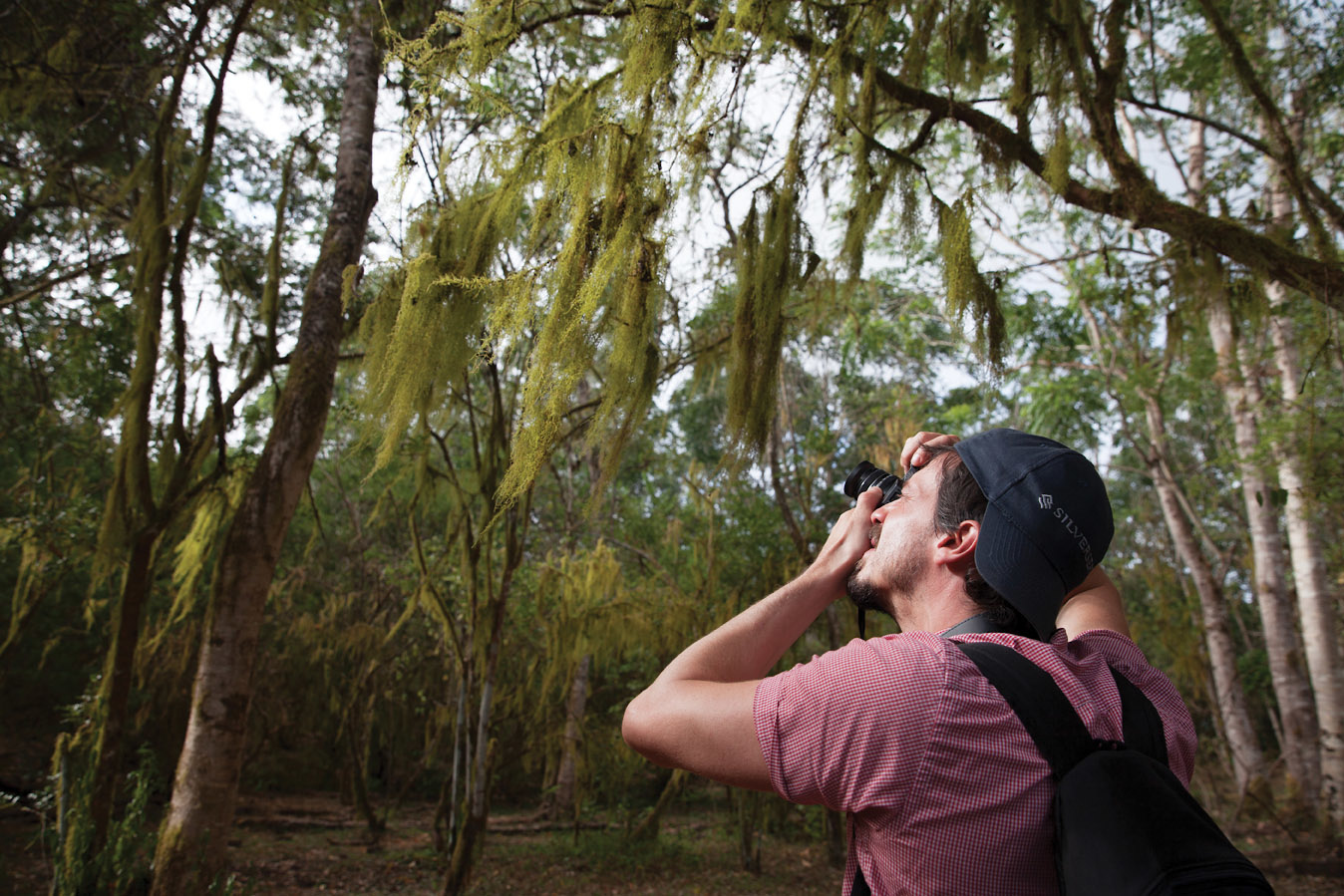
Silversea’s experienced Shore Concierge team are happy to assist, ensuring your shore- side experience is nothing less than a memory that lasts forever. Their knowledge and understanding of ports will truly add to your enjoyment and experience. Detailing history, local flavour, culture, regional customs, shopping tips and much more, they will make sure you get the best of your destination, wherever you are in the world.
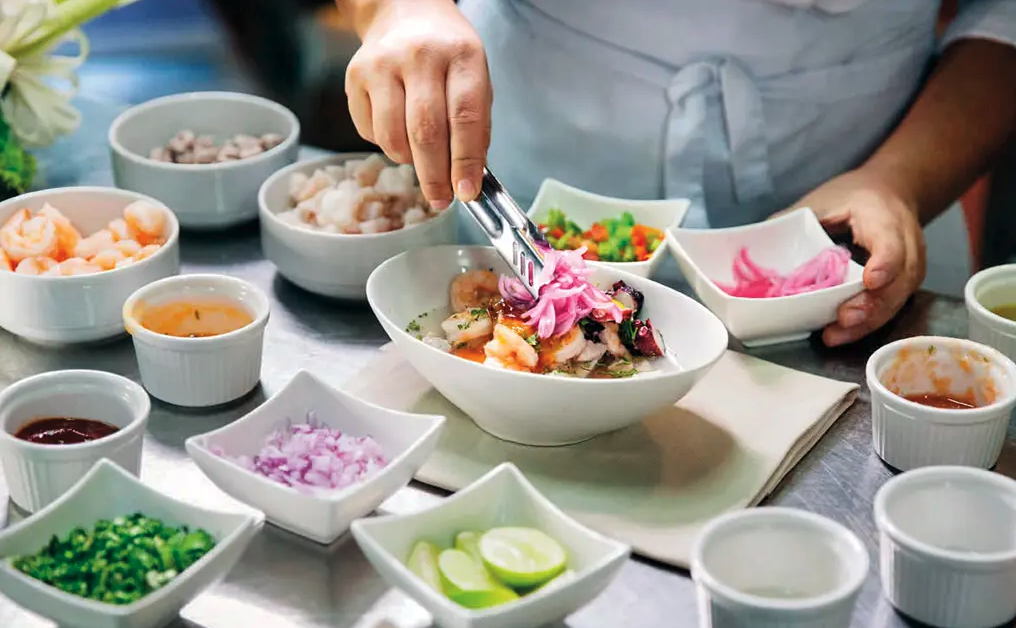
Throughout our many years of sailing the Galápagos, one thing has remained constant: the love our guests feel for local customs and cuisine. What are the ingredients that make up our signature dishes? How to prepare local recipes like our world-famous ceviche at home? Which is why we made sure Silver Origin provides only the most authentic culinary experience possible. In the kitchen, we bring them truly authentic Ecuadorian recipes using only the freshest local ingredients, accompanied by the best regional wine. And in our live gourmet preparation sessions and seminars, why not experience for yourself how to create and recreate all the flavours Ecuador and the Galápagos have to offer.
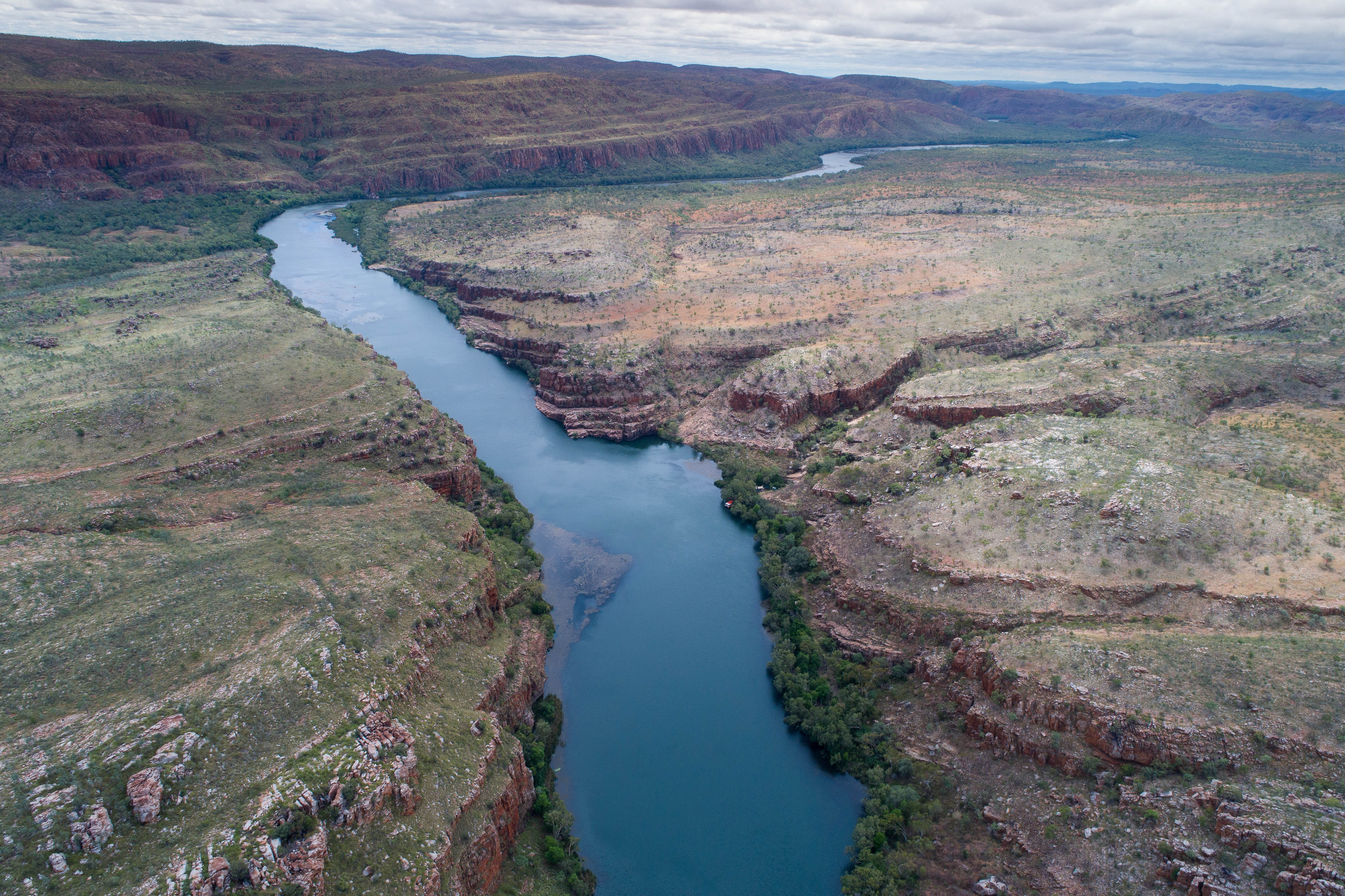
Multiple days at sea mean plenty of R & R for some, but others prefer to drink in all there is to offer on land. Our Mid-Cruise Land Adventures allow you to take full advantage of your time with us without missing a single thing! These short escapades offer an array of adventures, break up your sea days and allow for deeper exploration beyond the coast.
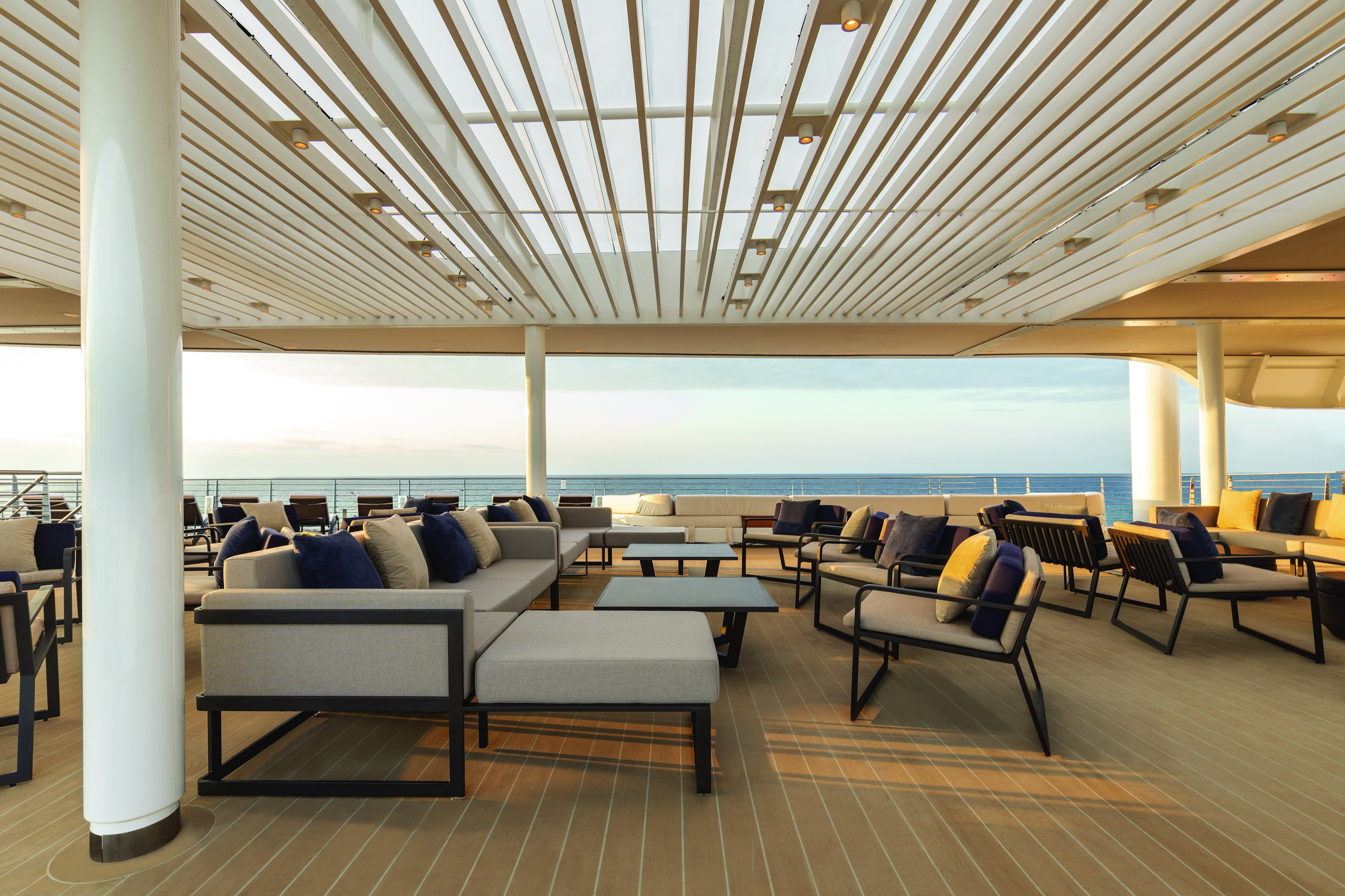
On the Upper Deck you will find jacuzzi’s & a lounge area.
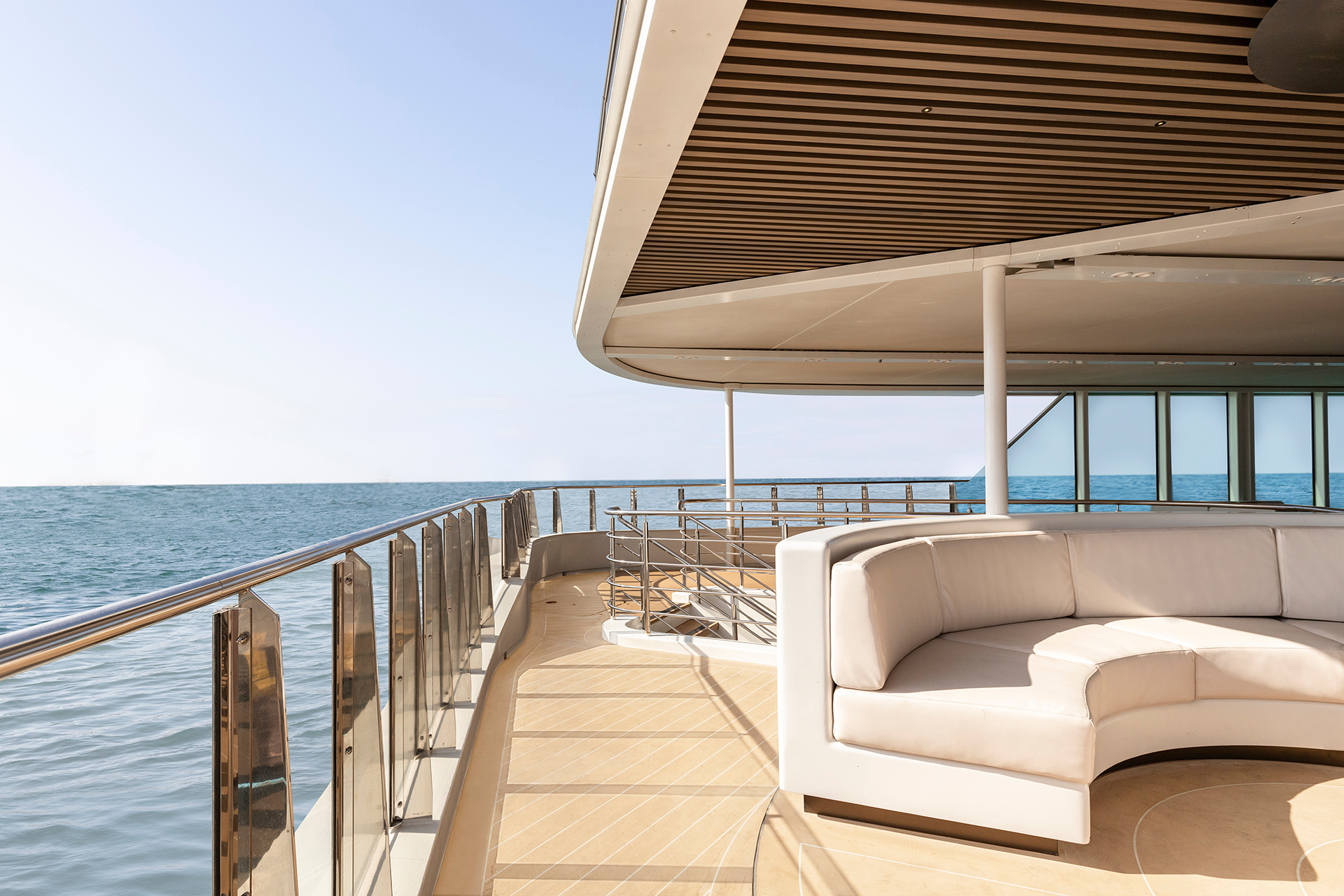
Continue your exploration of the Galapagos in the Explorer Lounge, undeniably the most elegant way to experience the islands. By day the space is where guests can meet for briefings with their Expedition Team, while by night, the space doubles as a relaxing lounge bar at the heart of the ship with a pianist playing for your listening pleasure.
Images are intended as a general reference. Features, materials, finishes and layout may be different than shown.
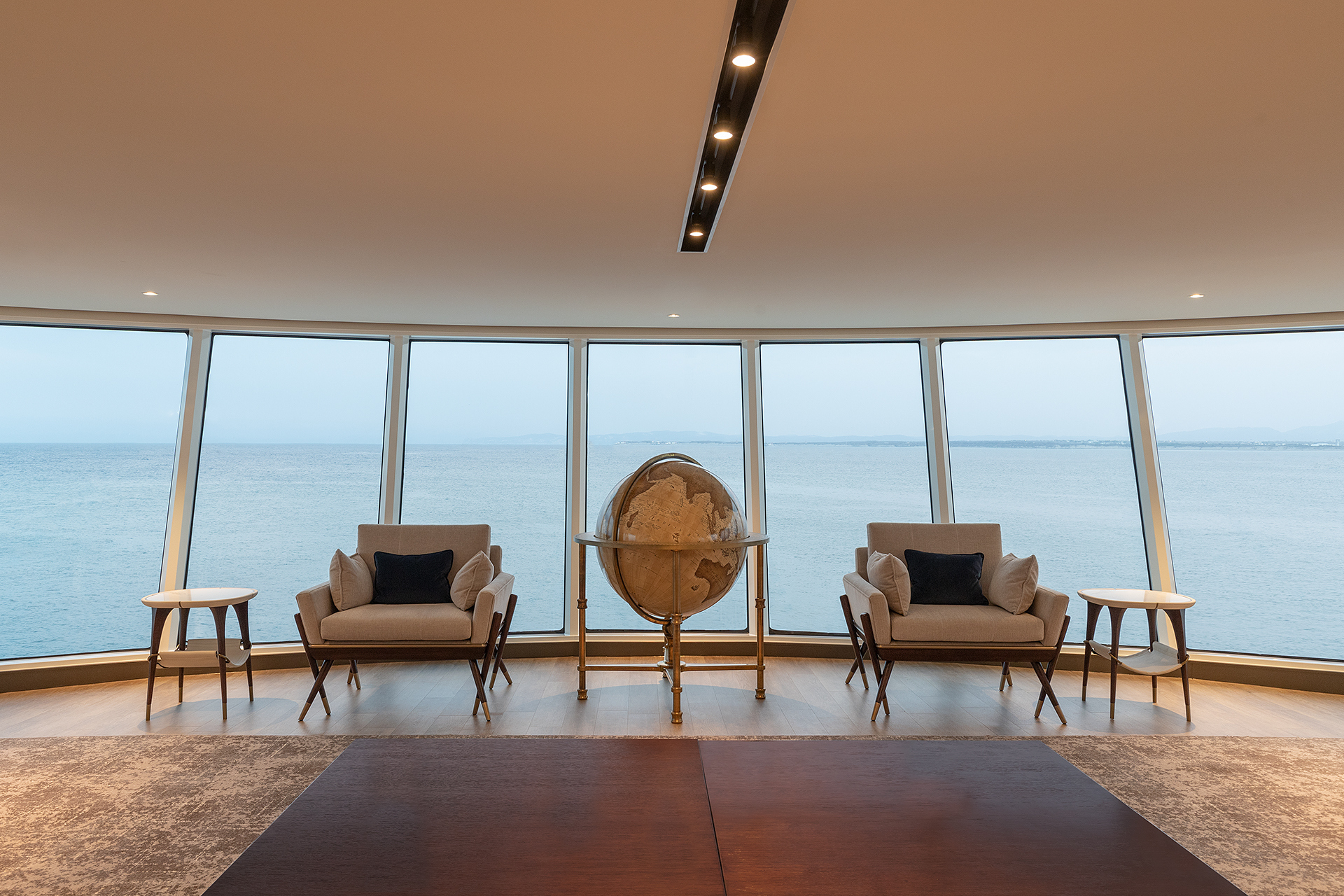
Located at the very front of the ship on deck 7, the beautiful Observation Lounge is one of the cosiest venues on board, with incredible sunrise-to-sunset views of the destination. The ideal place to relax, read a book picked from our carefully curated library, or just enjoy the refined ambience granted by the large floor-to-ceiling glass windows.
Images are intended as a general reference. Features, materials, finishes and layout may be different than shown.
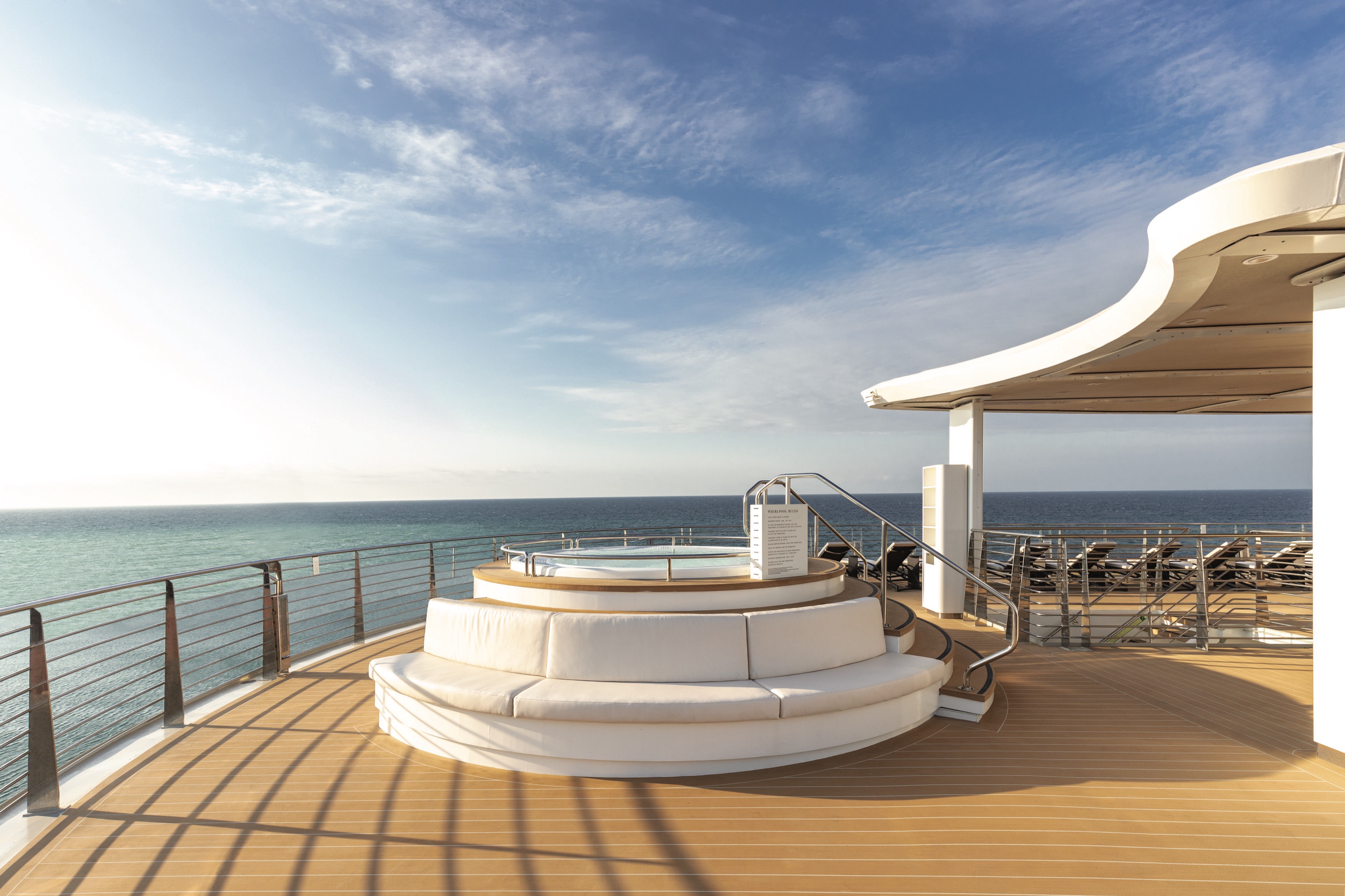
There are two outdoor whirlpools on the upper deck.
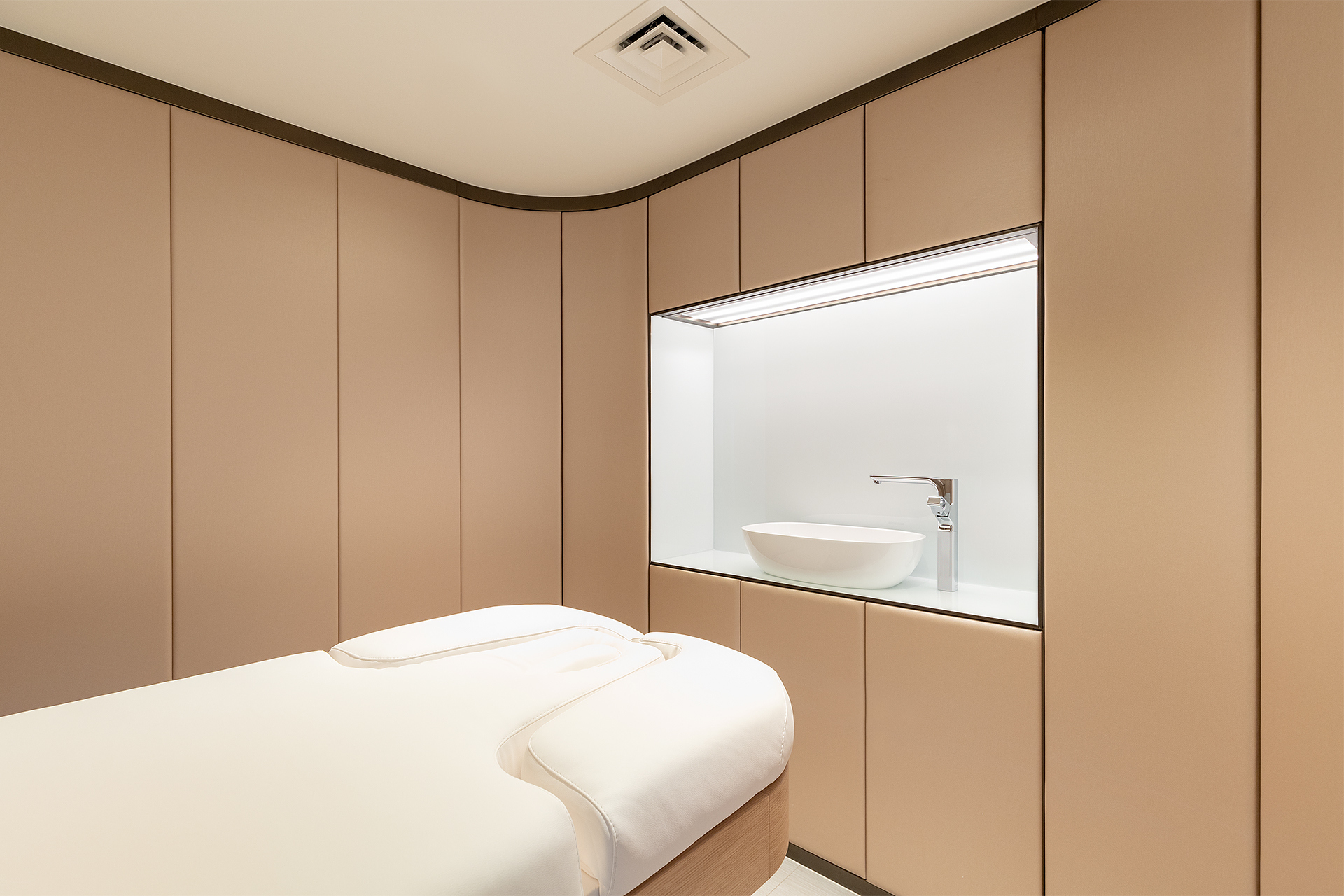
An anniversary to celebrate or simply just because you’re worth it, Silver Origin’s Beauty Salon offers guests world-class treatments from top to toe. Choose from a full range of options including hairstyling, manicures and pedicures for both men and women.
Images are intended as a general reference. Features, materials, finishes and layout may be different than shown.
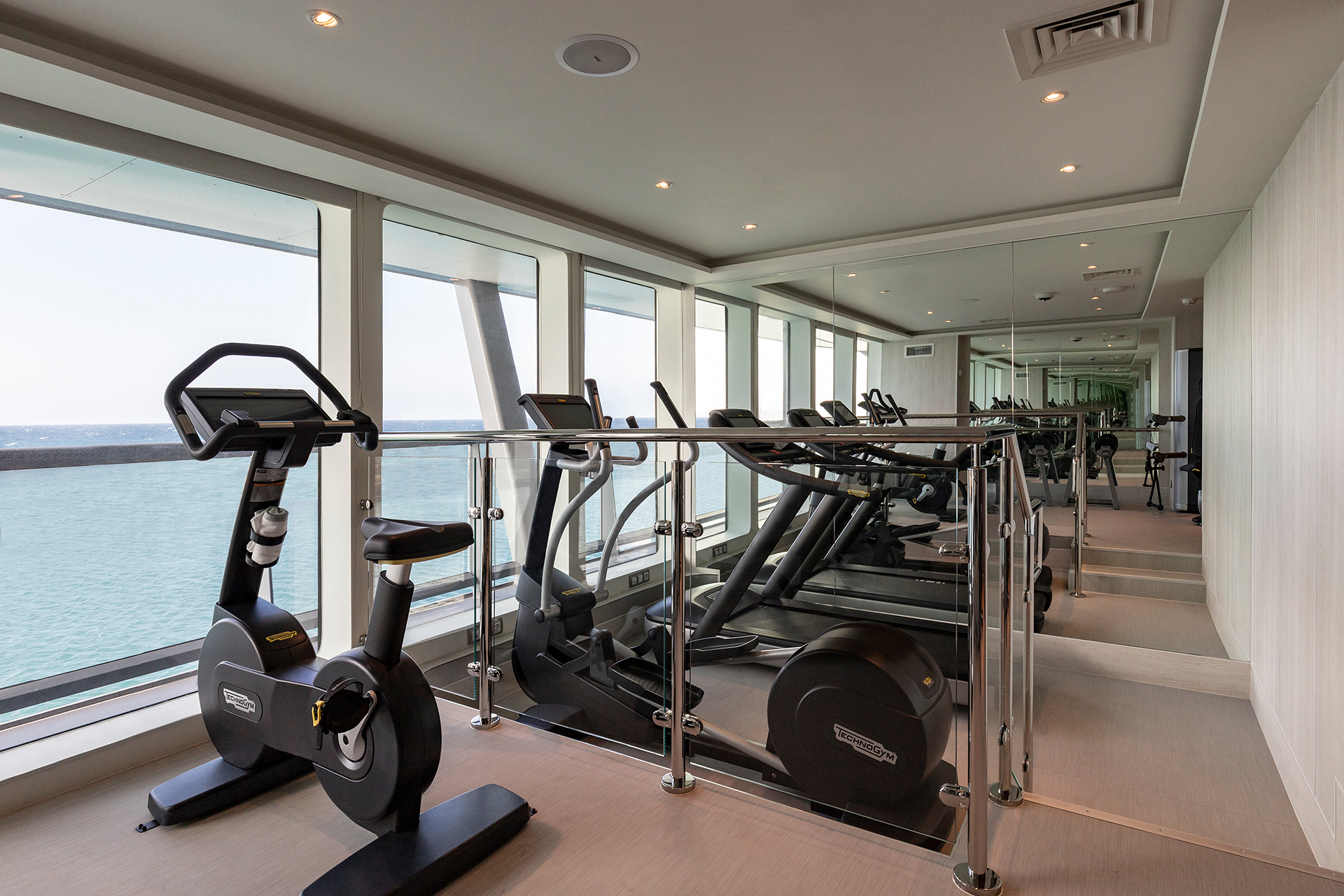
Silver Origin’s fitness centre offers guests state-of-the-art equipment for those who do not want to let their routine slide! Fully equipped with free weights and specialised machines, never has working out afforded such amazing views.
Images are intended as a general reference. Features, materials, finishes and layout may be different than shown.
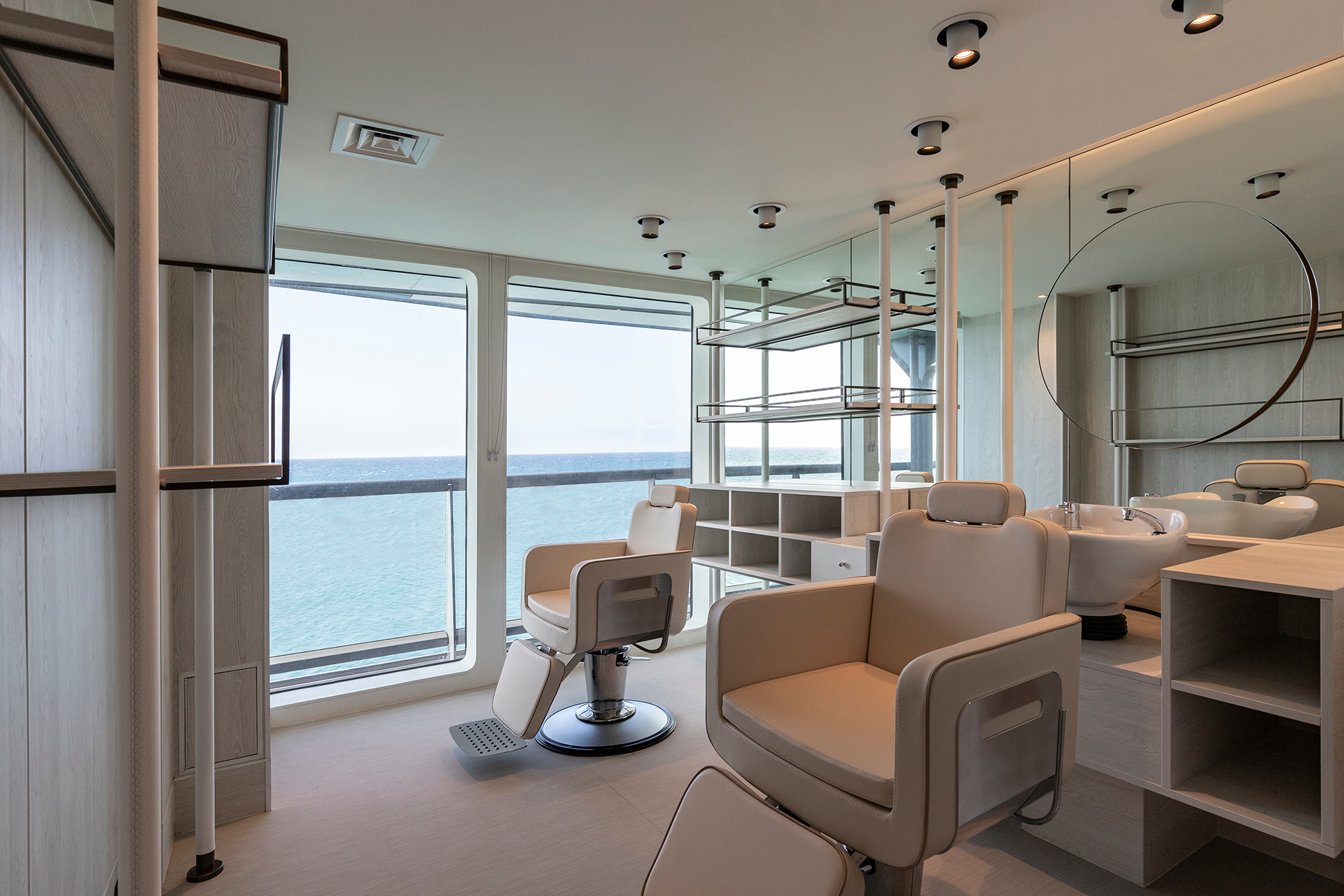
An anniversary to celebrate or simply just because you’re worth it, Silver Origin’s Beauty Salon offers guests world-class treatments from top to toe. Choose from a full range of options including hairstyling, manicures and pedicures for both men and women.
Images are intended as a general reference. Features, materials, finishes and layout may be different than shown.
During the day, casual wear, similar to five-star resort sportswear, is suitable for most activities. It is recommended to wear flat or low-heeled shoes on deck.
After 6 pm, our Evening Dress Code applies; jeans, shorts, sneakers, or flip-flop-type footwear are prohibited in indoor spaces.
TWO EVENING TYPES:
1. Elegant Casual
Ladies may opt for trousers, a blouse, skirt, or casual dress. Gentlemen may wear an open-collar shirt and slacks. A jacket is optional.
2. Formal Optional
Ladies may choose an evening gown or cocktail dress. Gentlemen should wear a tuxedo, dinner jacket, or dark suit with a tie. Adhering to our Elegant Casual dress code is also welcomed, but a jacket is still required for gentlemen when indoors
FORMAL OPTIONAL NIGHTS PER SAILING:
- 7 days or less – No Formal Optional night
- 8 to 14 days – 1 to 2 Formal Optional nights
- 15 days or more – 2 or more Formal Optional nights
If you have special dietary requirements, Silversea will make every attempt to accommodate your requests. Please advise Silversea of your needs on the Guest Information Form at least 75 days prior to sailing. Notification should be sent to specialservices@silversea.com
Silversea cruise guidelines state that children under the age of 18 must be accompanied, in the same or connecting suite, by a parent or other responsible adult over the age of 21 for the duration of the voyage. If the adult accompanying the minor is not their parent, a parental consent guardianship form must be signed by a parent or legal guardian and received by Silversea prior to sailing. Please contact our Special Services Department at SpecialServices@Silversea.com for a Parental Consent Form. Guests must be 21 years of age or older to purchase or consume alcohol. Silversea reserves the right to refuse to serve anyone who in its sole judgment may be under the influence of alcohol, or for any reason necessary in its judgement to preserve the health and safety of guests and employees.
Silversea cannot accommodate infants less than six months of age and reserves the right to limit the number of children less than three years of age (Silver Explorer, Silver Cloud and Silver Wind cannot accommodate infants under the age of 1 year, Silver Origin cannot accommodate children under the age of 5 years). Parents are required to sign a notarised waiver prior to sailing in order to grant a valid booking for children ages between 6 months and 1 year old. A signed and notarised waiver will be required for all children between these ages. Although Silversea accepts guests over the age of 6 months (over the age of 1 year for Silversea Expeditions), there are no special programmes for children on board our luxury cruise ships, and Silversea does not provide for the care, entertainment or supervision of children. Silversea reserves the right to limit the number of children less than 3 years of age.
Children under the age of 8 years old are only permitted to participate in suitable Silver Shore Excursions / shuttle service if the vehicles are equipped with the correct safety harness and seating equipment. Child harnesses and secure seating cannot be guaranteed. Silversea reserves the right to refuse children under the age of 8 years old on any tour on the basis of safety. Guests may use their own approved safety seat, booster seat or harness provided they are compatible with the local touring vehicle and can properly secure the child.
In addition, the Zodiacs used for Silversea Expeditions are unable to accommodate children younger than 5 years of age. As Silversea does not provide babysitting services, an adult family member will be required to remain on board with their child(ren) during Zodiac excursions.
Each Silversea ship is equipped with a Medical Centre, which is staffed by a doctor and nurse on 24-hour call when at sea. When docked, supplementary emergency care may also be obtained through local medical facilities. Guests may be charged for medical services and for medications used for their medical treatment. The Medical Centre is not intended or designed to provide on-going treatment of pre-existing conditions or for extended critical care, and Silversea is not responsible for the diagnosis, treatment or services furnished by shipboard medical personnel.
Wheelchair guests must bring their own collapsible wheelchair. Please note that not all shore excursions are suitable for guests with impaired mobility. Silversea strongly recommends wheelchair guests travel with someone who is able to assist them both ashore and at sea as Silversea may be unable to offer special assistance. Please note that wheel-on and/or wheel-off access may not be available at some ports-of-call. Silversea reserves the right to deny boarding to any guest who failed to notify Silversea of such requirement at the time of booking.
All guests are required to report in writing to Silversea at the time their reservation is made:
- Any physical or mental condition that may require medical or professional treatment or attention during the voyage
- Any condition that may render the guest unfit for travel, or that may require special care or assistance
- Any condition that may pose a risk or danger to the guest or anyone else on board the ship
- Any condition that may require oxygen for medical reasons
- Any intention or need to use a wheelchair aboard ship.
All Silversea ships are equipped to offer wireless (Wi-Fi) Internet access. You can use your own laptop to surf the Internet and check emails at Wi-Fi locations throughout the ship, or from the comfort and privacy of your suite. Computers, email and Internet access are also available on board at the Internet Café. However, it is important to understand that telecommunication services while at sea are via satellite and significantly different than high-speed connections on land back home. The signal travels in a similar manner to radio waves but at much greater distances. Therefore, onboard Internet access is not guaranteed at all times. Satellite communications are also affected by weather and the ship’s location. In particular, Internet service is extremely sporadic while in the Arctic. Guests aboard expedition cruises to/from Svalbard should be prepared to be out of communication for the duration of their time on board. (Please be assured that Silver Explorer always has emergency communication capabilities.)
Complete valet services, including laundry, pressing and wet cleaning, are available at an additional charge and may be arranged through your butler. Laundry service is complimentary for certain suite categories and for those Venetian Society members who have reached certain reward levels. A self-service launderette offers washing machines, dryers, irons and laundry supplies, allowing you to limit the amount of cruise luggage needed, especially for longer voyages.
At Silversea, the comfort, enjoyment and safety of all guests is paramount. To ensure a pleasant and safe environment, smoking is prohibited in most public areas, guest suites or suite balconies. However, cigarette, e-cigarette, cigar, pipe and vaporizer smoking is permitted in the Connoisseur’s Corner both indoors and outdoors (where applicable). In addition, cigarette, e-cigarette and vaporizer smoking is permitted in specifically designated outside areas and tables:
- Silver Nova, Silver Ray: Dusk Bar (port side);
- Silver Muse, Silver Spirit: Panorama Lounge (port side) and Pool Grill (port side);
- Silver Moon, Silver Dawn: Panorama Lounge (starboard side) and Pool Grill (port side);
- Silver Shadow, Silver Whisper: Panorama Lounge (starboard side) and Pool Grill (starboard side);
- Silver Cloud, Silver Wind: Panorama Lounge (port side) and Pool Grill (port side);
- Silver Origin: on open deck 4 aft;
Silversea kindly requests that all guests observe the non-smoking areas.

- Stargazing

- The Grill
- Observation Lounge
- Lounge Area
- Whirlpool
- Open Deck
- Elevator

- Superior Veranda Suite
- Deluxe Veranda Suite
- Medallion Suite
- Owner’s Suite
- Elevator

- Beauty Spa
- Fitness Centre
- Classic Veranda Suite
- Silver Suite
- Royal Suite
- Grand Suite
- Elevator

- The Restaurant
- Explorer Lounge
- Explorer Lounge Outdoor Area
- Elevator

- Basecamp
- Marina
- Medical Centre
- Elevator

